Samurai Jack: Exploring the Newfound Maturity
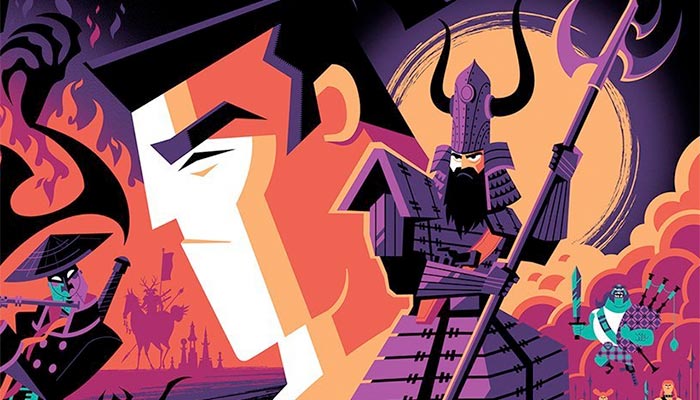
For anyone who grew up watching Cartoon Network in the early 2000s, there’s no doubt as to the palpable anticipation in regard to the long-awaited return of Samurai Jack. It’s shift from Cartoon Network to Adult Swim could only mean the series now had a chance to explore certain issues that may have only been given cursory treatment beforehand due to censorship. Nevertheless, Samurai Jack has always been a series about redemption and enduring loss, a trend that continues into the final season.
Allusions and Levity: Conquering the Child and Adult Demographic
To transcend the supposed dichotomy between childhood and adulthood, Samurai Jack includes references to media outside of the Samurai Jack universe that the average child may not be familiar with. There are smartly dressed gangsters with movie star-ready lines, the Triseraquins with their vaguely familiar British accents, and rabbit holes that lead into near-psychedelic, topsy-turvy worlds. Princess Mira’s initial uniform and mask in “Episode XLIV” should remind any Star Wars fan of Darth Vader. The three hundred Spartans Jack aids in battle during “Episode XXV”? The Mission Impossible or even James Bond vibe of “Episode XXXIX.” The list goes on.
Aside from making allusions to other popular media, Samurai Jack tackles a large demographic through its use of humor. Despite the initial tragedy of Jack’s fate, Samurai Jack has somehow always managed to add a bit of levity to Jack’s ordeal. The laughs here aren’t childish or cheap shots either.
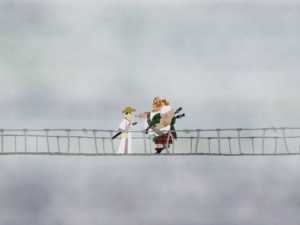
Jack’s friendship with the Scotsman is a pretty memorable one with a sense of humor at its core. When they first meet in “Episode XI,” they are trying to cross a bridge from opposite directions and are intent on passing through before the other one does. A running gag whenever they meet up later on in the series is their “politeness fights,” when their attempts at being courteous to each other end up in contests or even fights between them.
It’s a tale of a non-existent vying for masculinity. Neither Jack nor the Scotsman seems insecure about their own strengths and yet they constantly feel the need to showcase their own capability to the other. Neither is exactly a prime example of hyper-masculine conventions. Before befriending Jack, the Scotsman initially mocks Jack for wearing what he considers a “dress,” despite the fact that he’s always seen sporting a kilt. It’s just a matter of terminology. Their arguments are equally heated and ridiculous in spite of the respect they have for each other.
Perhaps the greatest asset to this comedic tone is Jack’s usually reserved demeanor. When it comes to comedy, he’s the classic straight man character. He’s the type to take just about everything seriously. Remember that time Jack was turned into a chicken in “Episode XXVII”? Before coming to terms with his newfound transformation, he still walks around with the dignity of a warrior. Despite his squawks and clucks, it takes him a considerable amount of time for him to realize he’s a chicken now and no one can understand his “chicken speak.” The transformation traumatizes him so much that after returning to his human form by the end of the episode, he shudders at the mere mention of the word “chicken,” even if it’s just to eat.
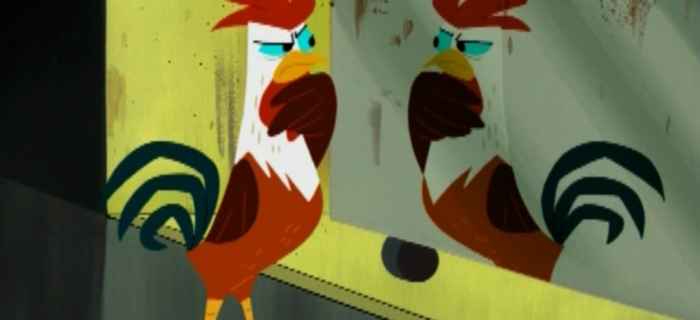
Jack’s reaction to being offered chicken after having just escaped his transformation into a chicken himself: “No! No chicken! Ahem, I mean no thank you. Actually, I would like to try the shrimp today instead.” 1
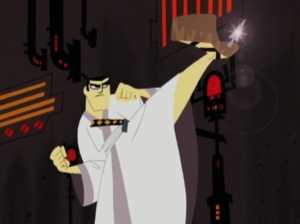
There’s also that time Jack tries on some heels as a replacement for his beloved pair of sandals, recently broken by a motorcycle gang, in “Episode XXVI.” He’s desperate for a pair of footwear he can fight properly in, but nothing seems to live up to his usual pair of sandals. Among the many types of footwear he tries on as a replacement, he happens upon a pair of heels with a razor sharp point. Footwear that doubles as a weapon? What could be better? However, Jack wasn’t exactly anticipating a newly effeminate image either. Not realizing heels are nowadays considered a particularly feminine accessory, the incident results in his getting catcalled and him fleeing in embarrassment in return.
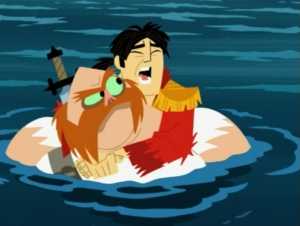
Samurai Jack manages to toy with Jack’s image in “Episode XLV” and “Episode XLVI” as well. To see Jack wind up as a waiter with a California “surfer dude” accent is more than a little amusing. Jack is usually dignified, polite, and composed in even the most unsettling situations. In these episodes, Jack behaves in exactly the opposite manner. A noble samurai is at once reduced to an apathetic and awkward young man unable to fight and better yet, one who faints at the slightest hint of danger.
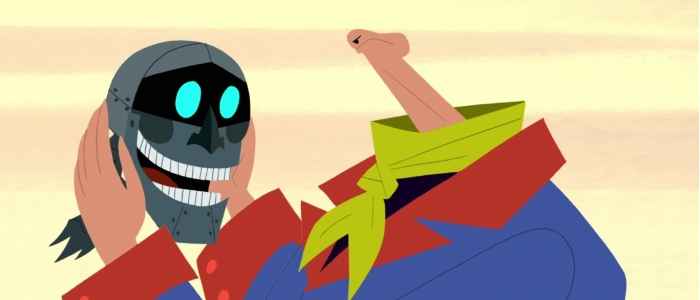
Likely to match the current age of Samurai Jack‘s original viewers, the series amps up certain violent and sexual aspects never tackled before. Still . . . anyone who was expecting the new mature label meant that shock-value and rampant explicit material was imminent were sadly mistaken. Season five maintains the level of subtlety previous seasons had. Like any kid’s movie in the theaters that inserts adult-level humor to keep parents entertained, Samurai Jack rarely goes beyond simple suggestion. Adult viewers will likely read more into specific scenes than a child would figure out on their own. The series takes advantage of Adult Swim’s greater permissiveness, but it never goes beyond its reach. It feels like a progression rather than a departure from the tone of the original.
Season five reduces the potential humor aimed in Jack’s direction or at his expense. He’s already been through enough as it is. Perhaps it’s also because of the change in narrative structure. Since Samurai Jack is no longer the mostly episodic show it once was, the pain Jack endures continually builds up and is heaped on his already existing problems. It’s not random adventures anymore where one can hit the “refresh” button each time and start over. Any humor in season five is usually reserved for side characters such as Scaramouche instead who serve as comic relief. Scaramouche is eager to earn the evil henchmen’s version of “Employee of the Month” from his boss Aku. He also spends much of the season trying to get around on his head alone, the rest of his droid body having been destroyed in battle by Jack.
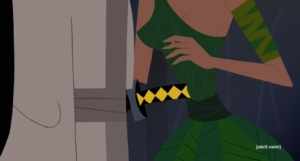
There’s also Jack’s blossoming romance with Ashi to consider. Aside from being a love interest who restores Jack’s faith in himself, her female presence is cause for some awkwardly hilarious scenarios between herself and Jack. Jack is always a gentleman at all costs and yet Ashi remains virtually unaware of certain rules of decorum that exist between the sexes. Jack’s been without female company for a long time and he’s likely never been physically intimate before. Ashi likely hasn’t had much male company either since her entire upbringing consisted of a female cult that limited her experience of the outside world, and like Jack, she’s been so focused on her mission to the exclusion of everything else. Ashi and Jack are both beginners at romance and their attempts at navigating the subtle divides between the sexes are where hilarity often ensues.
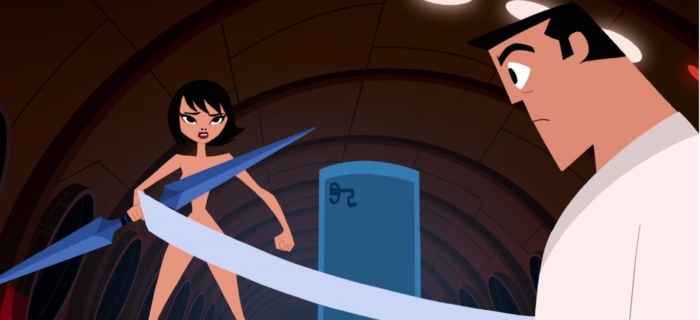
A Lighthearted “Master of Darkness”
Aku is undoubtedly scary, especially for anyone without Jack’s Aku-vanquishing sword (which includes just about everybody). Since he’s impervious to any and all Earth-bound weapons, he provides more than a challenge to the average fighter. Despite this fact, the adversarial relationship between Jack and Aku is at times played for comedic effect. Aku may be the self-proclaimed “master of darkness,” but that doesn’t mean he doesn’t know how to have a little fun. He’s as scary as he is entertaining. That’s probably the secret to his success as the major villain in all seasons of Samurai Jack. Aku is a showman, first and foremost.
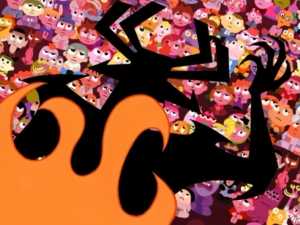
Just as much as Aku likes to play God and survey Jack’s movements from within his lair, he also likes to turn the camera on himself. Aku’s fond of broadcasts and other types of communication technology which Jack, because of the extreme time-jump he endured, is more hesitant to use. It feeds Aku’s narcissism. As if he were in a popularity contest against Jack, Aku even makes the effort to try and undermine the youth’s growing fascination with Jack as the vanquisher of evil. In children’s games, everyone wants to play Jack and no one wants to be Aku in “Episode XIII.” To remedy this troubling situation, Aku concocts various tales of how heroic he is and how evil Jack is, a lie so obvious not even those youngest amongst the children appear to believe it. Aku’s lost his touch and is desperate to remain relevant. The fact that the so-called “master of darkness” is desperate enough to appeal to children for his declining status, in order to beat Jack in some way, is pretty entertaining.

Aku resurrects the old Samurai Jack opening sequence upon capturing Jack and broadcasting the humiliation to the rest of the world in “Episode CI.”
Aku resurrects this broadcasting technique in the series finale when he wants to gloat about how he’s finally going to destroy Jack once and for all. He wants to show Jack’s apparent defeat to the whole world. He can’t help but brag when the moment’s right. Aku would fit very well with the selfie-obsessed crowd and those guilty of oversharing via social media. He wants everyone to know just how bad he is and likes to turn other people’s misery into entertainment. His impulse to show off taints his all-mighty aura by making him look a bit look a bit pathetic and desperate for attention.
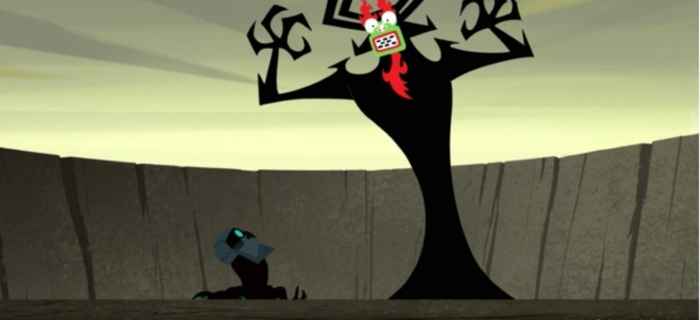
Aku also plays the role of a trickster character. In “Episode XLVIII,” he decides to call in numerous orders of potential warriors to defeat Jack, all of which are woefully inadequate at the job. Aku rarely fights Jack on his own, hiring other people to do the heavy lifting for him instead. He acts more like a sovereign in the middle of a battlefield, a precious gambit hidden away from the enemy’s sights. Whenever Jack and his Aku-killer sword get too close for comfort, Aku flees the battlefield like a frightened mouse (though he’d never admit to that). That’s maybe what differentiates the two. Jack takes everything upon himself. He shoulders his own burdens and doesn’t expect others to carry them for him, even when he desperately needs the help. Aku, on the other hand, expects others to fight his own battles for him and when he does fight on his own, he hardly ever plays fair.
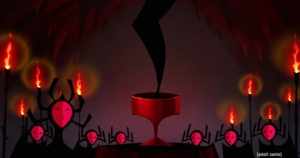
Aku even attains a certain “bad boy” status (believe it or not) when he finds out about the existence of a child he never knew he had. He remembers the conditions of Ashi’s existence as if he were an immature and unsuspecting father. The memories seem a bit hazy for him, but then there’s a quick flashback of Aku being summoned by the Aku-worshipping cult where he makes a donation of himself into a chalice. It’s like a sperm donation . . . and nine months later there’s a baby. Like a reluctant and absent father recalling that one drunk night he had with a certain someone which may or may not have resulted in pregnancy, he realizes Ashi is his daughter.
Aku realizing Ashi must be his daughter in “Episode C”: “But how can that be? I never . . . oh wait, there was that one time . . .” 2
He also has the stern, overprotective dad image going for him as well. Upon realizing Ashi is his daughter, he laments her teaming up with Jack. How dare she betray him like that? She’s the wayward daughter rebelling against her uptight father. A daughter, a father’s pride and joy in life, has decided to fall in love with his greatest enemy (Jack). Of course, Aku doesn’t have any sense of fatherly affection for his daughter. Ashi is just another potential minion for him. A powerful one at that . . . and one Jack would be reluctant to fight because of his attachment to her.
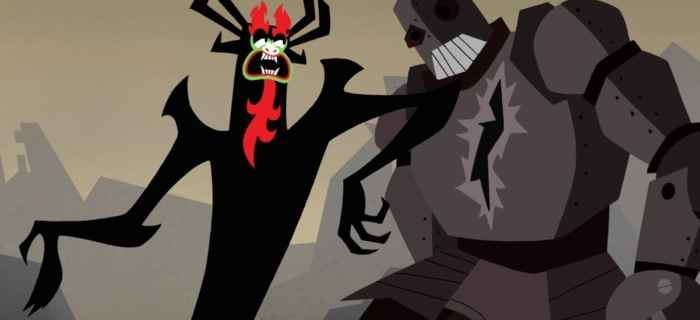
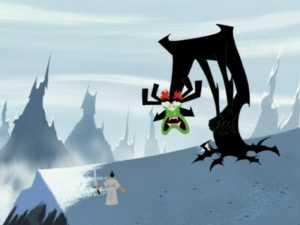
Aku is well-aware of his own tropes as the main villain. In “Episode XLVIII,” he acknowledges his own track record when it comes to fighting. Challenge. Fight. Flee. Rinse and repeat. When Aku isn’t behaving cowardly, his absence is an excused one in “Episode XLVIII” when Aku shows up sick at work. Who knew Aku could get sick in the first place? Sickness seems like something reserved for mortals alone. Since he’s an otherworldly being, shouldn’t he be immune somehow? Regardless, seeing a stuffy and sneezy Aku trying to terrorize people with his hacking cough and bleary-eyed expression is a satisfaction viewers likely never imagined possible.
Depictions of Violence
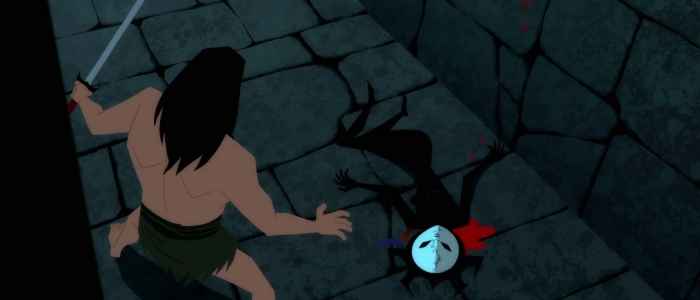
Season five is where Jack gets a taste of what being a warrior really entails. It involves bloodshed. Seriously wounded and under tremendous stress, Jack is put in a position where he has no chance but to kill someone. Jack has killed before, so that isn’t new. But he’s never killed another human being before.
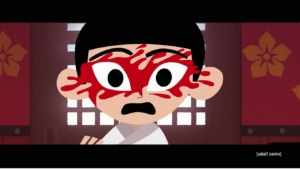
The act horrifies him. However, because he’s being relentlessly pursued by the daughters of Aku, he also has no chance to contemplate the weight of his actions. Though this is his first human kill, it isn’t the first time he’s witnessed a human killing. “Episode XCIV” provides viewers with a flashback to Jack’s childhood when he witnessed his father facing off against bandits. Blood accidentally splatters onto little Jack’s face and he reels back in shock and horror.
Jack has spent the last five decades unable to run from himself. It’s a lesson he’s learning pretty well in season five. That makes the urge to commit violence an even more cautious one. One’s actions weigh heavier on one’s conscious when alone.
How much of a choice do the daughters of Aku have when it comes to violence? They’ve grown up in a world dominated by Aku. To them, Aku is God and nothing exists outside of his dominion. Not even ladybugs are safe! How can one possibly expect any feelings of loving-kindness from them? The line between choice and fate is blurred here.
Jack tries to dissuade the daughters of Aku from attacking him, knowing he will do whatever he must to defend himself. His ultimatum rests on the idea that they are capable of deciding for themselves. As with “Episode XXVIII,” where Aku-worshipping dance music is used to brainwash and enslave teenagers into doing Aku’s bidding, one knows that isn’t always possible. The daughters of Aku have been brainwashed as well, maybe not by music but by how they were raised. Few people truly think for themselves as it is, but if one grows up in a cult there’s an even slimmer chance of that happening. Jack lived in a world before Aku so he always has a place of comparison, even if it’s only based on a distant memory. It is only when Jack shows Ashi that there was once a world before Aku that the element of choice comes into play.
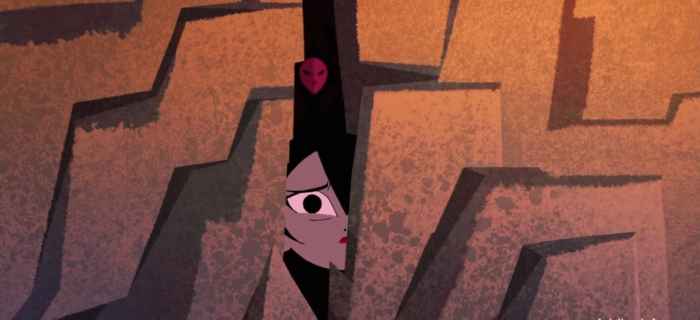
As a bit of foreshadowing, Ashi is shown to be the only daughter of Aku who has the tendency to question things. She’s never rebellious exactly, but she is curious. And that’s dangerous enough. This curiosity is squashed early on by her mother, who punishes her harshly whenever she steps out of line. Despite being seen as a potential troublemaker, Ashi’s considered to have the greatest potential out of any of the daughters of Aku. Perhaps this repression fills her with the greatest amount of misdirected anger. Which is why she’s saved just for Jack . . . and also why she has the greatest chance of being saved by him.
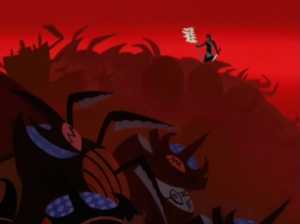
Depictions of violence have always existed in Samurai Jack. It wasn’t exactly clean fighting either. In “Episode III,” Jack is shown slicing through a legion of Aku’s beetle-bot minions. The fight is not so much made evident by corpses strewn over the battlefield as it is by the effect on Jack’s body. His clothes are torn to shreds, red cuts and scratches cover his chest, and slick black oil drips down from his face. Jack never gets too injured in battle.
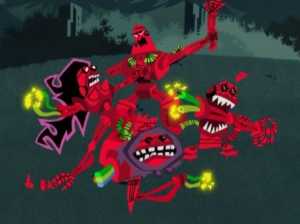
If viewers are looking for a little more hardcore violence, look no further than “Episode XV.” In the section titled “The Metal Eaters,” there are a group of robots who crave the taste of metal and have Jack’s sword on their menu. Robots who crave what they themselves are made of implies a type of cannibalism. This robot cannibalism is helpful when Jack tries to fight them off and they end up devouring each other, taking care of Jack’s problem for him. That’s about as far as Cartoon Network is willing to go.
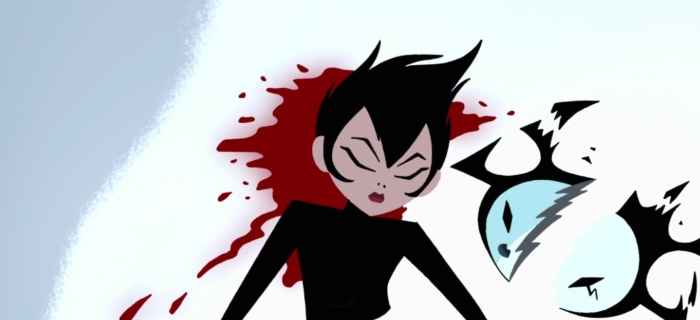
Killing robots or other non-human lifeforms is unlikely to cause as great a sense of grief as that of killing a member of one’s own species. Jack ends up killing more than just one other human. And they’re all women on top of it. Six out of the seven daughters of Aku are killed by Jack’s hand. The fact that they’re all warriors tasked with killing him does nothing to soften the blow.
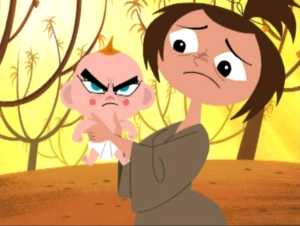
In season five, violence is a lot less detached. Perhaps there was a clue in the last episode of season four. In “Episode LII,” Jack is tasked with returning a kidnapped baby to its family. As a result, the baby has no choice but to experience what Jack does on a daily basis. The episode makes a point of focusing on the baby’s reactions whenever he witnesses Jack fighting and killing several robots. The violence doesn’t appear to affect him much beyond the initial shock until he’s returned to his mother who notices his changed, hardened expression right away.
It illustrates the consequences of Jack’s daily lifestyle in a way never previously addressed. Quoting Genndy Tartakovsky himself, Angelica Jade Bastién in Vulture.com‘s “Samurai Jack Was TV’s Most Poignant Depiction of Loneliness” states that Jack is designed to be “a stoic samurai hero, unaffected by everything he’s going through'” (Bastién). 3 Jack may be able to work through his emotions so that never bubble up to the surface, but one must clearly pay a price for those emotions regardless.
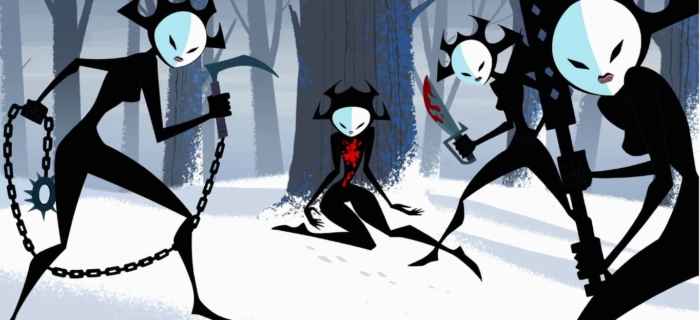
The daughters of Aku seem to embody Jack’s apparent stoicism as well. They never readily express even a hint of emotion. Not even genuine anger. Bitterness perhaps. However, a distinction must be made between Jack’s stoicism and the sociopathic behavior the daughters of Aku exhibit. Jack’s stoicism is him trying to remain in control of his emotions. He gives emotions their due without being consumed by them or allowing for the possibility of his emotions misdirecting him. The daughters of Aku deal with violence by becoming immune to emotion.
As assassins, emotions and even the slightest notion of sympathy are absent from their range of expressions. That’s to be expected when it comes to fighting Jack . . . enemy number one and a figure of their deepest-seated hatred. However, what one may not expect, is that the daughters of Aku have no tender feelings for anything at all . . . not even each other. Since they were children, they were encouraged to compete fiercely with each other for superiority. Any sign of weakness, from themselves or others, is not permitted. As adults, when one of their siblings is struck down by Jack, it’s merely considered a personal failure. She is left to die without ceremony or even the slightest hint of grief. She simply wasn’t good enough to be a daughter of Aku.
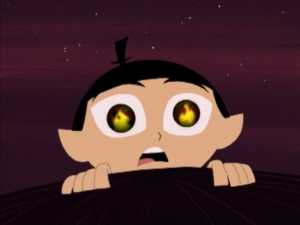
Violence seems to follow Jack wherever he goes. He learns at a young age to consider himself a liability. Because of his threat to Aku’s existence, Jack isn’t actually welcome in any time zone as long as Aku is still around. What’s made evident in “Episode LI,” when Jack is taken in by a small village in Africa as a boy, is that he can never stay anywhere for too long. Other people’s lives and livelihood are always at risk wherever he goes. Jack’s thought process is that it’s best never to get too involved with other people not because he wishes to be aloof but because it ensures others’ safety.
The Threat of Mortality
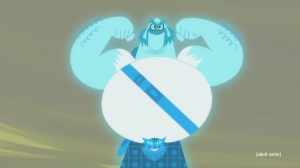
Season five’s Samurai Jack isn’t one’s typical cartoon where any evidence of being blown up or maimed in any way is in being covered in soot and having a dazed, stars-spinning expression. There’s the chance one may not walk out alive. Well, except for “Celtic magic” of course. There’s always that.
In season five, death has a greater sense of potency than in previous seasons. The threat of mortality is felt more deeply, not just by Jack himself but by the audience as well. This permeating feeling heightens the stakes of the series, making it clear that this will be Jack’s “final” adventure because we’re not sure how much more he can take. On one hand, that seems like a strange thing to say. If anything, Jack should feel as though he’s getting a taste of immortality in season five. As Jack says right before every episode in the last season:
Excerpt of Jack’s words in the alternate opening sequence for season five episodes: “Fifty years have passed, but I do not age. Time has lost its effect on me.” 4

Although Jack is hardly weak, he appears far more vulnerable than he once did. This is likely due to the overwhelming feeling of hopelessness he now feels. Jack spends a great deal of his time fearing for his life. He’s outnumbered by highly trained assassins who will stop at nothing to see him dead. His initial goal when facing them is simply to stay alive.
Wounded and running for his life, Jack even spends a few moments stuck inside a coffin in order to escape the relentless daughters of Aku who keep hounding him. Jack is forced to enact his own burial. Though this entombment is brief and hardly a solemn occasion, it forces viewers to consider the possibility of Jack dying (something viewers likely never considered before). Jack can’t die . . . he’s Jack. The series presents an intriguing counterpoint to this primal fear. In this last season, a projection of Jack’s dark thoughts questions Jack as to whether he actually wants the daughters of Aku to kill him so that he won’t have to do it himself. Jack denies that accusation, but the question still lingers in the air as a possibility. What better way to die than to say you had no choice in the matter? Perhaps a part of Jack simply craves an end to his journey if a victory isn’t possible.
A Change of Sound Design
One of Samurai Jack‘s most striking features is its use of silence in its storytelling. Jack’s childhood is delivered only in brief flashbacks which contain little to no dialogue. It seems to suggest not only the tranquility of Jack’s past before Aku came along but its almost non-existence. When Jack discovers the ruins of his home and consequently reminiscences about his time there in “Episode XIX,” dialogue (or the lack of it) plays a pivotal role. Strong memories of his first kiss and when he first wanted to learn to fight are all presented as non-verbal flashbacks. The only memory given even an ounce of dialogue is one with conflict at the center of it, such as when Jack is learning to fend off bullies.
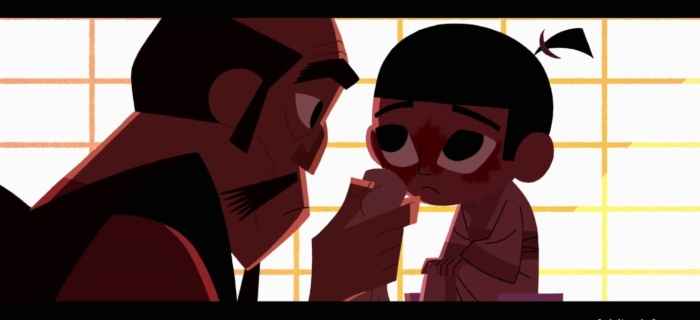
Fatherly advice in “Episode XCIV”: “The decisions you make and the actions that follow are a reflection of who you are. You cannot hide from yourself.” 5
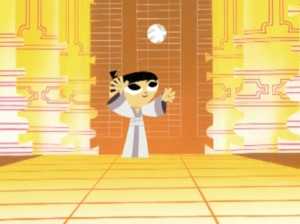
In “Episode XCIV,” while cleaning up his blood-spattered and stunned-silent son, Jack’s father imparts some wisdom about the value of the actions we take in life. These words serve Jack well because decades later he spouts them back at the daughters of Aku, giving them an ultimatum. Like this childhood experience with bloodshed, where Jack remembers his father’s words in adulthood when they best serve him, Jack discovers his old childhood toy (an object of his past) and takes it with him in “Episode XIX.” It seems that scenes with little to no dialogue are made to feel remote from Jack as if they weren’t simply memories but images of a world locked away from him. Conflict grounds Jack in a concrete world, a place of words and objects he may be able to reach into.
In season five, specifically in “Episode XCII,” not even those whom Jack saves are graced by his company or conversation anymore. It is now Jack who is locked away from the rest of the world. However, Jack’s mind is the one place disturbed by constant chatter. He spends a great deal of time talking to himself, which according to his perceptions are conversations with inanimate objects or animals. Talking to oneself is something most of us are guilty of, though few are likely to admit it. The little monologs that constantly run around in one’s head can become full-fledged conversations if one isn’t careful. Jack has spent the past fifty years keeping mostly to himself. The problem is that these voices aren’t exactly supportive. They’re just noises that distract him from his mission, accuse him of wrongdoing, and cause him to falter in his decisions. They’re an extension of Jack’s doubts and displaced onto other characters. With their help, Aku is safe from him. Jack can’t possibly battle Aku and himself at the same time.
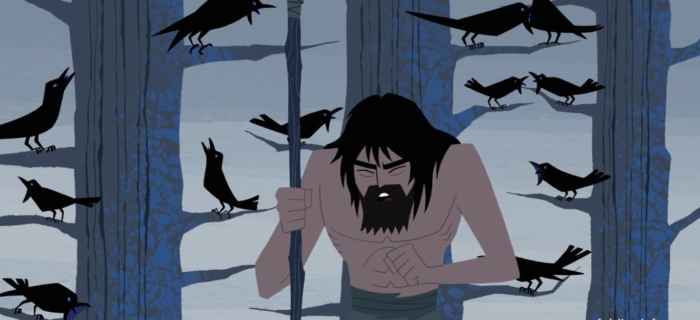
That sparse dialogue that’s characteristic of Samurai Jack re-emerges and creates an entirely different atmosphere. It’s not only present in Jack’s self-loathing inner monolog. Upon Ashi’s capture, she keeps talking non-stop. It’s not conversation or even an argument. It’s just words . . . spiteful, hateful words delivered over and over again.
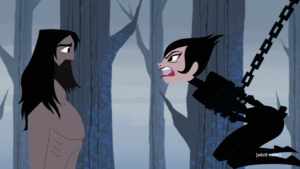
Ashi repeatedly tells Jack to die, as if saying it enough times would make it come true. Maybe it’s just wish-fulfillment or she simply wants to drive Jack insane by being as annoying as possible. Regardless of her own intentions, her rhetoric as a daughter of Aku has a specific flavor. Her head has been filled to the brim with rampant, embittered thoughts that have no filters or spaces between them. They’re like one exhaustive run-on sentence. When coming face to face with him, Ashi’s vocabulary is incredibly limited to just death threats. Evil lacks creativity.
It’s as if she’s reciting some incantation, hoping a curse might descend upon him if she speaks badly enough about him. Through Ashi’s words, Jack can see how dangerous his own thoughts have become. By hearing her relentless barrage of words being launched in his direction, he has to learn to quiet his own mind for a bit.
Voices from the Past
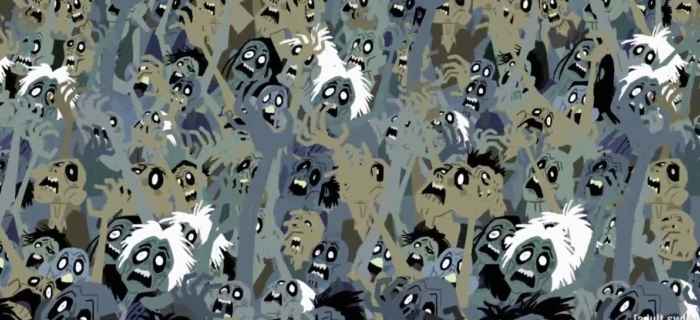
The most persistent voices in his head are those whom Jack feels he has failed, mainly his parents and residents of his homeland. Their reactions range from sheer disappointment to pure outrage. In “Episode XCII,” Jack sees his parents and then hundreds of skeletal figures in a river floating downstream. All of them reach out to him in desperation and sorrow.
When a vision of Jack’s father visits him, he is engulfed in a rage that is a literal flame. All of these images illustrate the relentless swirl of conflicting emotions eating Jack up from the inside. They may seem like pure illusions, but for Jack these voices are real and they have consequences for not only his state of mind but his future. What’s the point of moving forward when everyone from your past no longer has any faith in you?
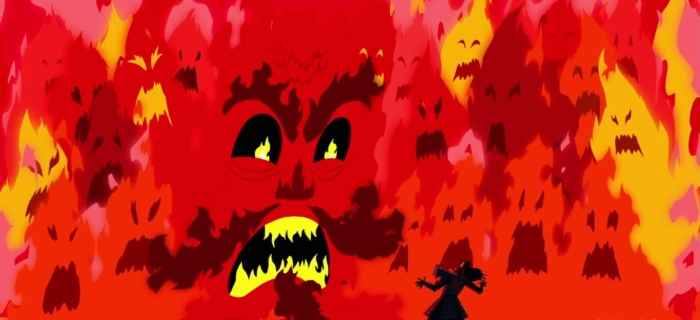
In the section titled “Summer” of “Episode XLIX,” Jack has to deal with visions of his own making as well. Clouds of sand rise up and become monsters Jack has to battle in the desert. What the viewers and Jack himself don’t realize is that these are just figments of his imagination. That’s not an unusual scenario for anyone who’s left stranded in the desert, where the intense heat and dehydration can play tricks on one’s mind. Jack’s visions in season five aren’t caused by heat stroke or some hallucinogenic, which makes them all the more frightening in their regularity.
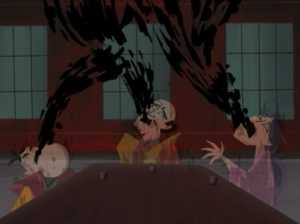
In “Episode XXXV,” Jack enters a truly terrifying haunted house where he must also confront visions. Doors, windows, and rooms all seem to disappear. Jack starts questioning his sanity. Is it the house or his mind playing tricks on him? It’s probably one of Samurai Jack‘s most frightening episodes. He soon realizes a demon is taking possession of the household and its residents. The setting is particularly comforting for Jack because its aesthetic is that of a traditional Japanese home.
By the end of this episode, the girl who asked for Jack’s help in finding her family has her family restored to her, representing Jack’s greatest longing. The boundary between literal and figurative ghosts is blurred here. Images of the past are shown to be not only dangerous but unreal. Ghosts in “Episode XXXV” take possession of memories and trap souls, which calls Jack’s entire mission into question. Is Jack’s mission one of recovering what he has lost or is he simply chasing the ghosts of things he can never hope to have?
The Fate of a Failed Warrior
These hallucinations are not the only metaphysical presence Jack has to deal with. There are also his ancestors. A shadowy figure basked in a green mist, a warrior on his horse, repeatedly appears in season five. For a long time, viewers don’t actually know who this figure is or what he wants. Most of the time this figure just hangs around in the background. Never saying anything. Never making any demands. He may be summoning Jack to join him, but it’s up to Jack to know when it’s time. It seems a fate awaits Jack that he’d rather not consider. It’s reminiscent of those doomed characters who are continually followed by the figure of death no matter how much they try to evade it.
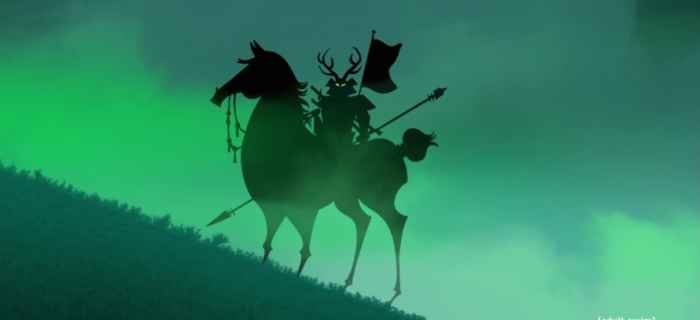
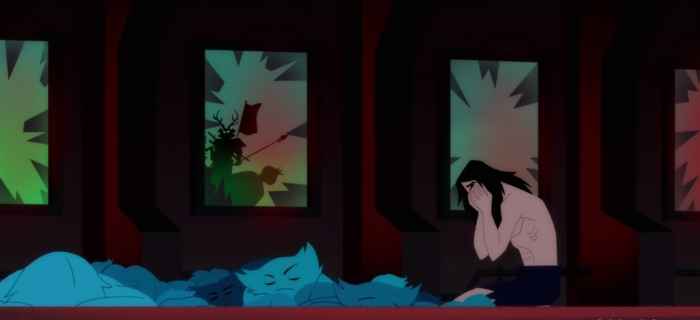
When Jack is feeling at his lowest this spirit of an ancient warrior strikes. When Jack feels his efforts to save a group of children has resulted in their deaths, he feels that maybe killing himself is the best solution. Before this, Jack must have thought his status as a samurai was to an extent redeemable. By seemingly falling so low as to not even be capable of saving children, Jack must think there’s no longer any point in living.
Even if he previously never intended on committing suicide, Jack must have contemplated it at some point. Though it’s rarely publicly acknowledged, one doesn’t have to be seriously suicidal to have thought about killing oneself. Humans have a tendency toward self-destruction as it is.
Suicide has different connotations in Japanese culture than it might elsewhere. It’s often perceived by other cultures as either a cowardly act or a sinful one. However, as a samurai, committing suicide under certain circumstances can be considered an honorable act. Seppuku, or “honorable suicide,” would absolve Jack of his wrongdoing. It’s sometimes required of a warrior who falls into enemy hands and prevents him from being captured and imprisoned. In other cases, it’s committed by disgraced samurai thought to have brought shame upon himself (Andrews). 6
Traditional seppuku involves much more gore (disembowelment for instance) than Samurai Jack ever contends with or at least decides to portray (Andrews). 7 All viewers ever see is Jack preparing to impale himself with his own sword in an act similar to seppuku. Since Jack’s suicide is sanctioned by his ancestors, it does not have the negative connotations it might have under other circumstances. Jack believes he is doing the world a favor. His purpose has been served, even if his mission is left incomplete.
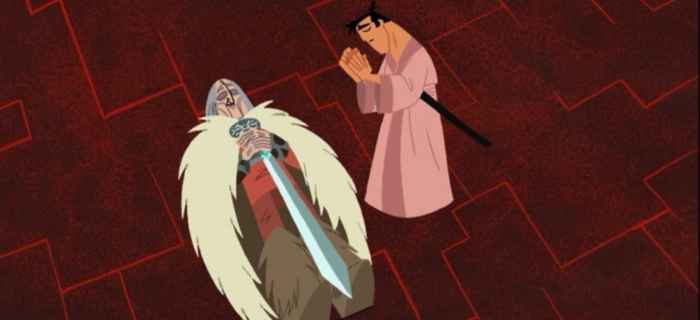
Jack has dealt with this dilemma before, even if only vicariously through another person. In “Episode X,” Jack is lured to a mysterious land where he meets an imprisoned warrior longing for his spirit to be released. Since this warrior is a Viking, the only way for his spirit to make it into Valhalla (similar to the concept of “heaven”) is for him to die nobly in battle. Jack is reluctant to fight anyone unwarranted. However, since the Viking is yet another victim of Aku’s wrath, this warrior has something in common with Jack. The only compassionate action becomes freeing him. It’s almost a type of assisted suicide because the Viking wants so desperately to die and Jack has to help him get there.
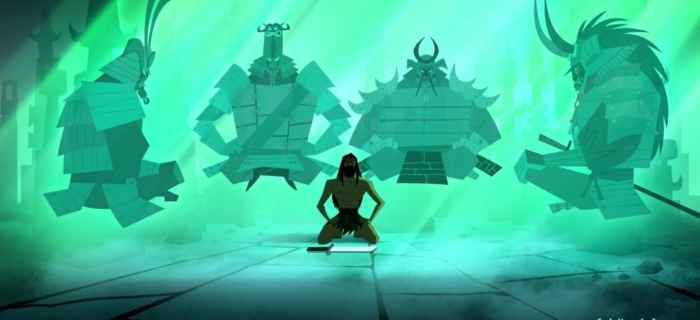
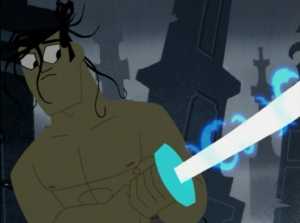
Jack’s attempted suicide in “Episode XCVII” also takes place, appropriately, in a graveyard. It’s an ominous sign that death is near. It’s reminiscent of Jack’s time in a graveyard when Aku steals his sword in “Episode XXX,” not realizing that the sword can’t be used by evil against those who’ve done no harm. In that episode, it’s Jack’s sword that refuses to let him die. In season five, Jack spends much of the season separated from his sword so this isn’t the case. Now even his own sword has deemed him unworthy and rejected him.
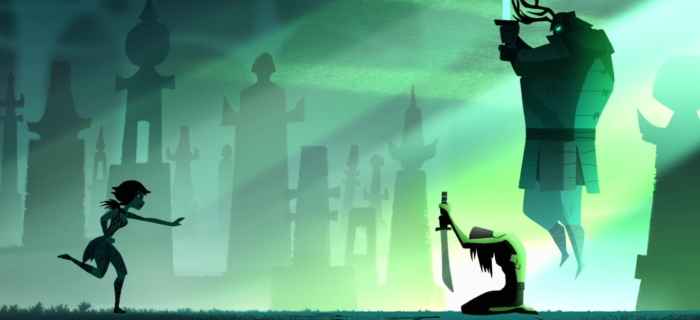
However, Jack’s decision to kill himself is based on a simple misunderstanding. The major difference is that by season five Ashi’s there to save him. Had Ashi been absent, Jack might have killed himself over a false conclusion. With Ashi in the picture in “Episode XCVII,” it’s Romeo & Juliet without the tragic miscommunication. During Jack’s confrontation with Aku in the graveyard in “Episode XXX,” he only had himself to rely upon.
Once Ashi convinces Jack that his life is worth living, his mindset quickly reverts back to challenging Aku’s overlong reign. Jack’s suicide would be playing right into Aku’s hands. Aku would finally be rid of the samurai without having to lift a finger so to speak. It would also be continuing the cycle of hatred Aku enjoys so much, having Jack’s death be based on self-loathing and for Ashi to lose the only beacon she has for redemption. It can’t end that way.
The Birth of Hatred
How Aku came to be is a subject that has already been covered in the two-part episode known as “The Birth of Evil.” Aku wasn’t “born” in the usual sense of the word. Like any god, he’s born fully formed and in full command of his powers. Like something out of Pandora’s box, he’s a creature released because of a human’s mistake (Jack’s father to be specific). Aku wasn’t just born to be bad, he practically invented it.
Season five is the first time viewers witness ardent followers of Aku. Viewers may have seen characters submit to Aku’s all-mighty power or Aku summon assassins to tackle Jack before, but it was never as obsessive and cultish as it is in the final season. It’s a stark contrast to “Episode XIII,” where Aku is desperate for fans of any kind. Unlike previous seasons, the daughters of Aku are not henchmen commanded by Aku to do his bidding. Much like religious zealots who believe they’re doing God’s work, the daughters of Aku seem to believe that Aku’s will flows through them and will ultimately destroy the samurai who stands against their idol.
They are the antithesis to Princess Mira of “Episode XLIV,” a female assassin amidst the glut of male assassins sent to kill Jack. Princess Mira only wants to achieve Aku’s demands to restore her and her kingdom’s freedom. The daughters of Aku are even a far cry from the hitman robot of “Episode L,” whose sole reason for existence is to serve Aku and yet is the only robot given the ability to feel. He even concedes that, contrary to popular opinion, his ability to feel makes him a better hitman because it gives him a reason to survive. His defeat at the hands of Jack is a tragic one which likely inspires sympathy from viewers since he is fighting to rescue his pet dog from Aku’s clutches. With the daughters of Aku, blackmail isn’t needed to inspire their fervor.
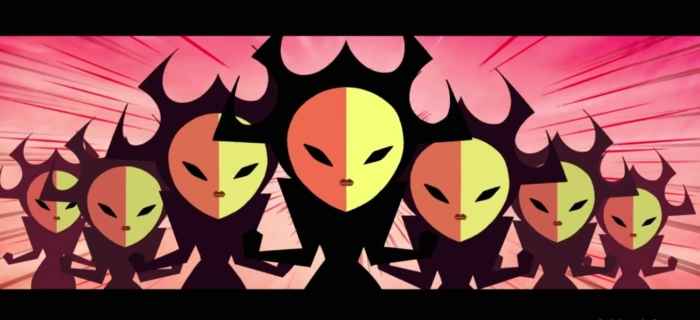
Those who belong to the Aku-worshipping cult, including the daughters of Aku, are rarely ever shown without their masks on. With their masks off, the only distinguishing characteristic between the daughters of Aku is their haircuts. Their names (if they indeed have any) are unknown to viewers (“Ashi” being the exception). Perhaps Ashi being referred to by name is a sign of her future dissent. The child who is most frequently called by name by their parents is typically the one who causes trouble. The other daughters of Aku never need their names mentioned because their mother never expects them to fall out of line like Ashi does.
With their masks on, they all look alike. Any potential of connection through personality or character has been erased. It suggests that all of them are disposable and replaceable except Ashi. However, viewers know that isn’t true. Only seven of these Aku-spawns were created. They’re not like Aku’s robotic henchmen who can be pumped out of factories on conveyor belts. Despite being human, the daughters of Aku have suppressed their humanity so much so that witnessing their deaths onscreen does not feel entirely different from watching Jack cut down the beetle bots.
The introduction of the daughters of Aku introduces an examination of parent and offspring relationships. Both the daughters of Aku and Jack appear to respect the notion of filial piety, which is a younger person’s show of respect towards one’s elders (including one’s parents). The Aku-worshipping cult, specifically the daughters of Aku, relies on unquestioned order and obedience. If one isn’t up to par, one is quickly eliminated from participation. Filial piety here is based upon brutal competition to be the favorite child and fear of failure that results in elimination. The daughters of Aku not only submit to Aku but to their mother, the cult leader, as well.
In Jack’s case, filial piety takes on a slightly different atmosphere. Jack’s allegiance to his parents is also based on fear, but Jack has an overwhelming “fear for” his parents that trumps his “fear of” his parents. He also only has one authority to submit to (his parents and homeland as a collective), rather than being caged in from either side as the daughters of Aku are by their mother (the textbook definition of an overbearing and micromanaging parent) and Aku (a distant but looming presence of God-fearing proportions). Yet Jack is more shackled to his fate than the daughters of Aku are. A strict upbringing such as the daughters of Aku have only increases the possibility of pushback. Defeating Aku is an inherited task, one passed down to Jack from his father. Jack is certainly afraid of failure because letting his parents down is not an option. What hurts his parents also hurts him and thus they share a common goal. Shirking his responsibility by rebelling isn’t possible for him.
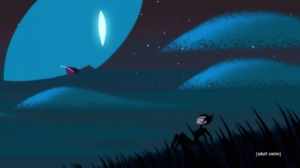
Ashi, on the other hand, benefits a great deal by rebelling against the parental figures in her life. Her entire life has been about keeping her in the dark. She is never loved by her mother, who simply regards her daughters as tools of vengeance. Ashi’s mother appears omniscient. Disguised as the moon, she appears before Ashi when Ashi begins to have doubts about her mission. She’s the textbook definition of an interfering mother. Much like Aku is for Jack, Ashi’s mother is the all-seeing and all-knowing authority figure who surveys and monitors nearly every moment of her existence. It is also Ashi’s conquering of her father which results in her achieving her full potential as an individual, able to tap into Aku’s powers without succumbing to his nature and becoming a simple replica of Aku.
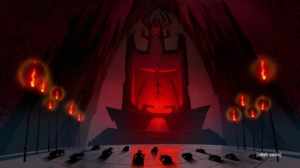
Season five begs the question: “Why are all of Aku’s worshippers female?” There’s no easy answer. Does Aku have some raging sex appeal no one knows about? Probably not. Maybe it’s to target Jack’s gentlemanly sensibilities, knowing Jack would find it difficult to hurt anyone let alone a woman. Aside from giving Jack a love interest, perhaps it’s because by being female this cult is the one most capable of continuing Aku’s legacy by merging his essence with that of a mortal. Gods, such as those of Greek mythology, are known to have casual affairs with humans every once in awhile, some of which beget supernaturally-gifted children as well. This might be a variation of that. What’s a god-like creature to do but find new ways of propagating oneself?
Terms such as “god” or even “demon” are never explicitly used to describe Aku (he’s just a blight upon the Earth), but his all-mighty power and influence are undeniable. A god has to perpetuate the idea that he exists without an expiration date. God-like beings are often polarized to two seemingly contrary modes of being. There are the gods who exist aloft, living in another dimension no mortal can trespass. They are aloof and uninterested in the goings-on of mortals. Then there are the interfering gods, the ones who like to play games and use the Earth as their personal chess set. Aku craves too much attention to be the first type, but Jack’s seclusion in season five forces him into a position resembling the former anyway.
The Boredom of Immortality
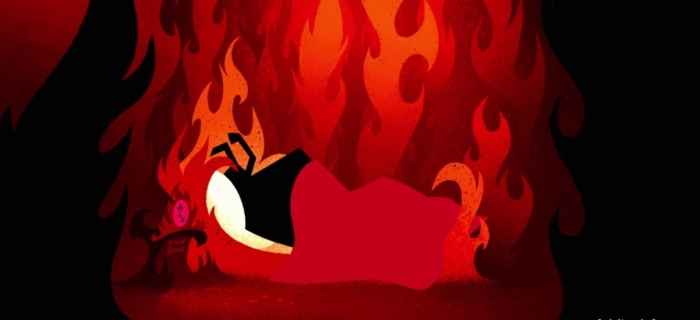
Season five’s Aku is more of a recluse than he was in previous seasons. He mostly just hides out in his lair and doesn’t want to be bothered by anyone unless it’s an emergency. With the last of the time portals gone, Jack seems to be trapped in Aku’s demented future for good and so Aku has no reason to fight his greatest opponent anymore. Jack has mysteriously disappeared, likely wandering in search of something to live for, and it seems he’s taken Aku’s purpose with him as well. The game repeatedly played between Jack and Aku in previous seasons is at a standstill and yet it seems they will never be rid of each other either.
Aku deals with Jack’s fate differently than Jack does. Aku is a known shape-shifter. He can change physically as well as replicate himself. It’s no wonder he’s survived as long he has. This mercurial nature and multiplicity apply not only to Aku’s physical body but his mindset. Aku is a known narcissist so he prefers listening to his own words whereas Jack is much more skeptical of the voices in his own head. Since he’s grown bored and apathetic, Aku can only comfort himself with his own thoughts and conclusions reflected back at him and legitimized.
In dealing with Jack’s disappearance, there are scenes where Aku is essentially talking to himself and answering back as himself. For Aku, self-reflection means adopting several personalities to function as his personal set of yes-men. Take that at-home therapy session for instance in “Episode XCIII.” By counseling via a mirrored monolog, Aku can only end up with the same old ideas and opinions. Despite being a shape-shifter, Aku’s nature never changes. Hate finds ways of retreading old ground and actually thrives on the monotony of primal fears and urges. Aku runs the risk of falling into a rut and underestimating Jack’s ability to counterattack.
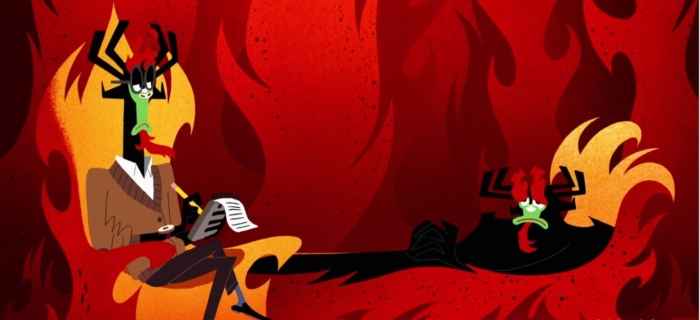
Jack doesn’t have the consolation of being able to disappear whenever he likes, no matter how much he may have the urge to. He’s always dependable to viewers as well. Viewers could jump in whenever they felt like it and Jack would take it from there. The original opening sequence was self-explanatory: “Gotta get back to the past . . . Samurai Jack.” Despite Jack’s repeated failures in defeating Aku and returning to the past, the number of people he’s inspired along the way is near immeasurable. Every obstacle Jack faces along the way feels fresh and new despite the repetition of his main goal. Though Jack, modest as he is, likely never realizes the full extent of his goodwill.
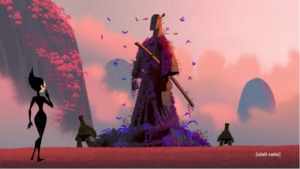
Monuments, like the one Ashi finds in “Episode XCVII,” are made in his honor. The image may remind viewers of the Aku shrine the cult constructs for their idol. However, the monuments made in Jack’s honor are never publicly acknowledged by him. They are simply testaments to and artistic expressions of the public’s faith in him and aren’t endorsed or encouraged by Jack whatsoever.
Aku’s shrine is something the cult creates for Aku as well as themselves, but Aku makes a point of wanting improvements to reflect a “truer,” more impressive likeness. Since Aku’s likeness is a shrine, it demands constant religious devotion and attention. Prayer isn’t a one-time deal. Yet this demand, as much as it can be a recommitment and a reassurance of one’s devotion, also provides a window for one to lose one’s faith. Aku wouldn’t be able to handle his followers renouncing him, but Jack never asks for followers in the first place. Jack’s humility may make it seem as though he has no need of soul-searching. However, his self-assuredness should not be mistaken for invincibility.
The Descent of the self
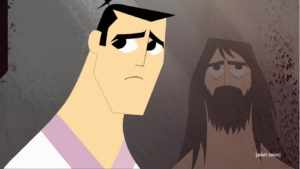
Fifty years of solitude without aging is a heavy weight on Jack’s psyche. Just look at Jack’s striking change in physique for evidence. Jack has transformed from a clean-cut warrior into a more worn-down version of himself. Despite his newfound agelessness, his body is haggard and tired. He’s even grown a beard! This is a key sign for audiences not to expect the same Jack they once knew. He won’t be there.
The Jack viewers have come to know and love has relatively few weaknesses in comparison to his virtues. There are multiple instances of Jack’s self-sacrificial nature. He’s not nor has he ever been a selfish guy. For a narrative about intense suffering, Samurai Jack has never been a story about redemption. By all means, Jack has never done anything to deserve his fate.
Even when Jack’s been given chances to further his own mission, he has sacrificed those chances when they had the possibility of impeding someone else’s goals. Case in point is “Episode V,” when Jack befriends a group of scientists who have technology capable of time-travel. He also displays this particular trait in “Episode VII” when he saves a group of cursed archers and decides to destroy a wish-granting well, against his own self-interest, so that no one else will be trapped by its manipulative powers ever again. In “Episode XXXVI,” when he meets a group of monks trained in the same style of martial arts as him he does the same. Unwilling to let them sacrifice themselves on his behalf, to give Jack time to reach a time portal on his own, Jack makes a U-turn to help them. None of these decisions are ever easy for Jack to make. He makes them not because they’re easy, but because they are the only choices worthy of a warrior.

As noble as Jack is, he’s not without his flaws. Due to his impressive capacity for goodness, Jack can sometimes be naive. In “Episode XII,” when gangsters convince Jack that they’ve abandoned their crooked and shady lifestyle and are eager to live on the right side of the law, Jack believes it wholeheartedly. Since he’s capable of seeing the best in people, he could never foresee them deciding to use the Neptune jewel they stole to turn a profit instead.
Another one of Jack’s most obvious faults is his tendency toward self-righteousness. In the very first episode, when Jack undertakes his father’s mission to defeat the re-emerging force of Aku, Jack doesn’t fully realize what he’s gotten himself into. He makes the mistake of underestimating his opponent by assuming his impressive skills, many years of training, and motivation to avenge his family and homeland will be enough to destroy Aku. When Jack is just moments away from striking Aku down, like most cinematic-worthy heroes, he takes too much time in his farewell speech and allows Aku to take advantage. Since Jack is someone who’s seen his homeland burned to the ground and his parents enslaved, he’s already been touched by loss. He’s brave and noble as any warrior should be, but he has yet to reach a depth of soul to outweigh all of that hidden anger. His time spent in an Aku-filled future is what gives him that bottom-of-the-barrel level humility he has by the final season.
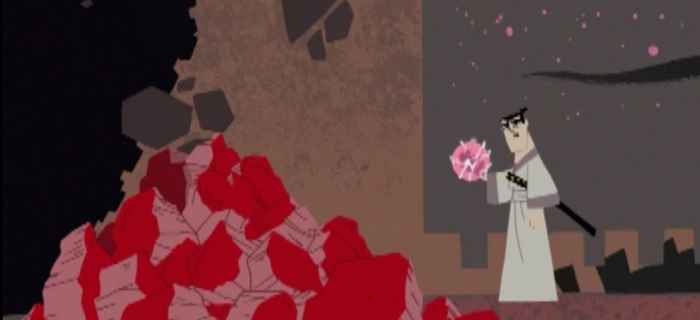
Jack can also be accused of having tunnel vision. He often gets so focused on his own goals that everything else falls by the wayside, sometimes to his and others’ detriment. In “Episode XXXII,” Jack nearly drowns himself because of this! He has to cross a lake and since there’s no boat nearby, by sheer will and determination he decides to plow through the water on foot instead. Jack obviously doesn’t get very far with this method and instead ends up back on the same shore he was on to begin with, spluttering and choking up water. This tunnel vision certainly fails him in “Episode XV” when Jack is tasked with rescuing a fairy captured by a gargoyle and trapped by a magic spell. During his attempts to rescue her, the fairy often tries to interject his efforts with her knowledge of what he should or should not do. Paying her words no mind, not out of disrespect but out of the belief that he’s capable of figuring out the best method on his own, Jack ends up failing them both.
The Way of the Samurai
Though Samurai Jack never intends to present a historically accurate depiction of traditional Japanese society, it does at least allude to certain aspects of it. As a samurai, Jack would belong to an “elite class” according to Ed Grabianowski in “What is a Samurai?” (Grabianowski). 8 Jack certainly lives up to the name of samurai, which means “those who serve” (Grabianowski). 9 Being the Emperor’s son, Jack is more of a prince than just a simple warrior. Nonetheless, the motto of servitude is certainly one Jack strictly upholds. However, “the code of honor . . . known as Bushido . . . was not a formal set of rules that all samurai followed,” thus enabling Jack to have a bit of flexibility when it comes to codes of conduct (Grabianowski). 10
Samurai often had a connection to religious philosophy. Martial arts don’t typically concern only fighting. They are meant to refine one’s entire being. A man who is simply a skilled fighter, but spiritually desolate is at a disadvantage. A man who does not master himself cannot hope to overcome anyone else. According to Ed Grabianowski in “What is a Samurai?,” this meant samurai training was entrenched in the teachings of Zen Buddhism. Samurai understood “the need to train and practice until their combat skills became like breathing; something they did naturally, without having to think about it” (Grabianowski). 11 This is similar to the Taoist concept of “wu wei,” which entails mastering something without any effort by being in tune with The Way or Tao (the flow of the universe).
It explains how easily Jack bests Da Samurai in “Episode XLII.” While Da Samurai exerts all of his energy when fighting, Jack hardly breaks a sweat. When Jack faces off against him, it becomes clear what the title of samurai can become if used poorly. It can become a front for arrogance and conceit. A facade with no substance behind it. Da Samurai uses the title of samurai to intimidate people and cater to his ego, but being a samurai isn’t about pride or beating people up.
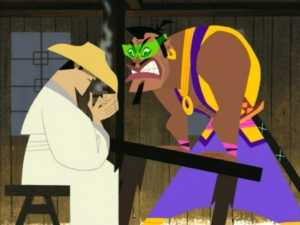
Jack is really a nameless warrior, “Jack” being a nickname given to him without his true name ever being revealed. Da Samurai, on the other hand, is known only by the title he gives himself (with “Da” replacing “the” to make himself sound cooler). It’s like being known only as “The Security Guard” or “The Cashier.” Sounds kind of silly when it’s put like that. Maybe he belongs in a wrestling arena. Da Samurai is also decked out in trendy clothing and (unbeknownst to everyone else) all the extra muscle padding he needs to make him look more physically impressive. It’s for intimidation purposes only.
For a man who embodies the image of a calm and collected warrior, Jack has a surprising amount of anger pent-up in his system as well. This puts Jack at odds with the code of ethics he seeks to uphold. It’s certainly understandable for all he’s been through. Time and time again, Aku puts Jack’s mental state through the wringer by giving him hope and sending it crashing to the ground.
Violence doesn’t just occur on the battlefield. The violence one inflicts upon oneself can be just as dangerous as Da Samurai’s issues with his ego. Jack’s darker side appears in season five and constantly questions Jack as to why he would prolong his own misery. Since there are likely no time portals left for Jack to escape into, what’s the point of even trying to stick around? Jack’s dark side keeps showing up and offering death as a way out. It presents a disturbing side of the noble samurai one might never have known existed.
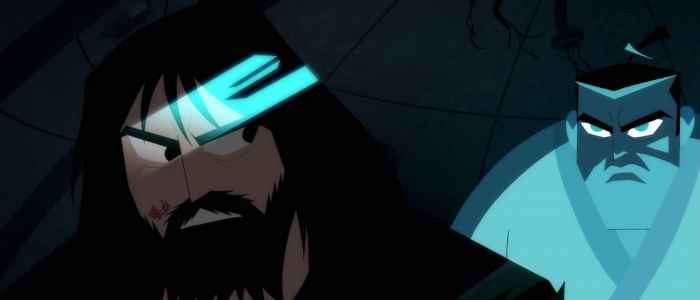
This angry, embittered projection of Jack’s psyche in season five looks the most physically like the original Jack. He’s young, well-groomed, and wears the familiar white robes and carries the sword of a samurai. The real Jack of season five looks Christ-like, dressed only in rags with a scarred body and unkempt beard. The only major difference is his change of demeanor. Jack’s embittered side is often shown hunched over and antagonistic, with beady eyes and predatory teeth. This bitter and angry projection may look like the Jack viewers know and love, but he’s as far from him as anyone could be. If Jack remembers his father’s words from when he was a little boy, he should take heed of them:
Jack’s father, the Emperor, giving Jack advice as a young boy: “Always be alert, my son, for the presence of evil is sometimes right behind you.” 12
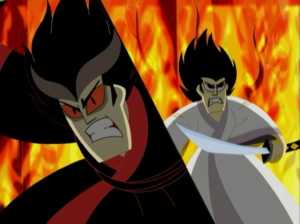
This isn’t the first time a dark side of Jack has appeared in the series. Remember Mad Jack of “Episode VIII”? Aku took advantage of Jack’s emerging feelings of bitterness, resentment, and frustration and used it against him. Mad Jack is a result of Aku’s direct interference. He’s much like the Rowdy Ruff Boys in The Powerpuff Girls (Mojo Jojo’s attempt at creating an anti-Powerpuff Girls). The only way for Jack to defeat Mad Jack, who is only born out of Jack’s hatred, is by regaining his inner state of calm. Mad Jack is defeated when Jack realizes he is merely a projection, a “funhouse mirror” of Jack’s pent-up emotions. All Jack needs to do is refuse to play into Aku’s hands. Once Jack regains his inner sense of calm, Mad Jack disappears and has no power over him anymore.
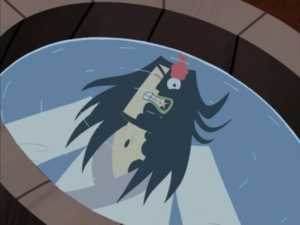
What about that time Jack caught an infection from a coughing and sneezing Aku during “Episode XLIII”? Fragments of Aku’s personality accidentally infiltrate Jack’s system, causing him to commit questionable actions. He starts resorting to thievery and random acts of violence without him even realizing it. Jack isn’t really fighting against a darker version of himself here but against Aku (only on a much more personal level . . . on the homefront so to speak). That’s what an infection, a virus, is after all . . . something that overtakes and corrupts the current nature of something. Jack becomes a divided man, someone who must fight to retain his nobler impulses. However, it’s also revealed that Jack’s ailment can be physically cured by external healing but only Jack can eliminate Aku from the inside.
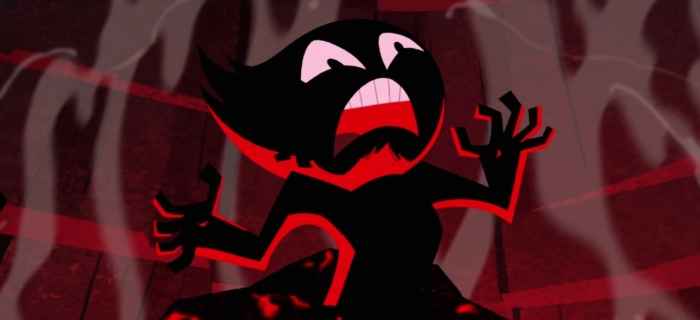
Ashi goes through a similar internal crisis of self in season five. The Aku-worshipping cult indoctrinates its future assassins. The daughters of Aku are brainwashed from birth so as to reduce the risk of individual rebellion. Whether one likes it or not, Aku will be seared into one’s skin (both literally and figuratively). Not only are they born of Aku, but they are forced to coat themselves in Aku’s darkness as children to reinstate their allegiance to him.
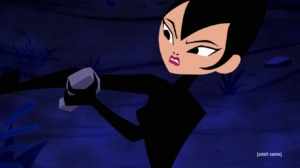
This extra coating is something Ashi has to literally rub off her skin as an adult, but that’s the only part of Aku she can get rid of in “Episode XCVII.” “Episode C” shows that despite Ashi’s drastic change of appearance, she apparently still retains the scent of Aku. One can fool others based on appearances alone, but changing the essence of someone requires a much more radical transformation. It’s clear that Ashi’s reinvention of herself isn’t complete. Much like Jack with his Aku-infection, she needs to defeat Aku’s power over her from the inside out (not vice versa).
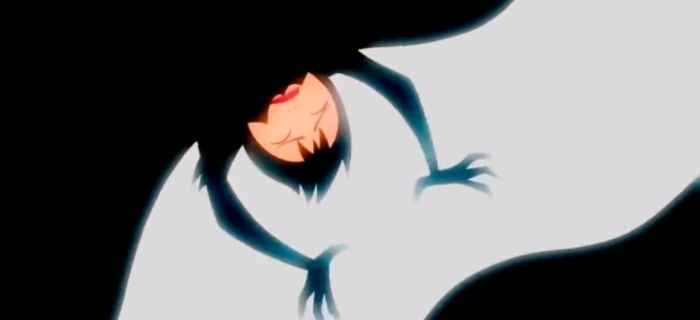
It turns out Ashi’s Aku-nature is hidden deep down like a dormant volcano. Upon learning Ashi is his daughter, Aku easily overwhelms Ashi’s own sense of who she is. It turns out that this is both the worst possible end to Jack’s life, to be killed by the woman he loves, and the greatest opportunity for Ashi to fully realize what she’s capable of outside of Aku’s influence.
The dormant anger Jack contends with in the final season is a marked contrast to his previous dealings with his dark side. Whereas Mad Jack was created by Aku’s interference, Jack’s dark side lives entirely in Jack’s head. Jack’s dark side in season five bristles with impatience, distrust, and violence. As with Ashi’s Aku-nature, he stews and bubbles beneath the surface, undermining Jack’s perception of any danger. He’s often depicted in alternating colors of red and blue . . . hot and cold . . . bad and good. His changing appearance is perhaps a sign of shifting loyalties when it comes to Jack. Jack’s dark side is a character who comes and goes, appearing only during Jack’s darkest moments. Jack is forced to banish Mad Jack right away if he wants to continue on his journey (Mad Jack literally blocks his path), but he can ignore his dark side in season five long enough for it to fester so much it gets out of control.
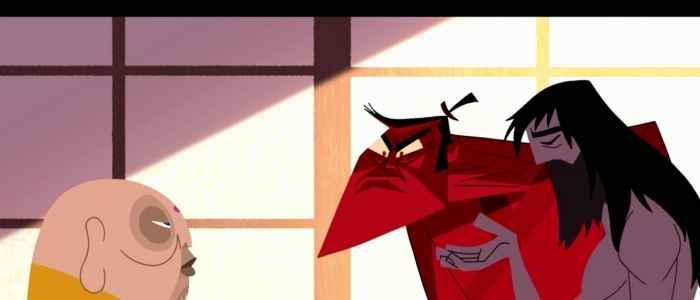
Once Jack seeks spiritual guidance, it is clear Jack’s dark side must be dealt with for him to proceed any further on his journey. He breeds suspicion, encourages violence, and leads doubting men into despair. None of these are hallmarks of a samurai. Like Satan’s temptation in the desert or Mara’s attempts to divert Gautama Buddha’s path to enlightenment, Jack’s dark side makes grand promises that are ultimately empty. It turns out this dark side is the reason Jack’s sword has abandoned him. When it comes to enlightenment, there’s no possibility of bringing any baggage along. Once Jack banishes this dark projection from his mind, the forsaken gods reappear and offer Jack what he needs most . . . his sword back and a renewed sense of purpose.
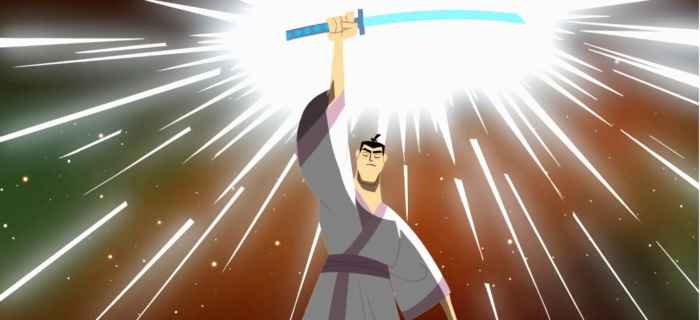
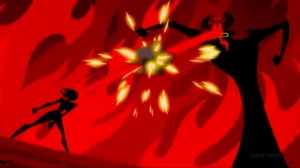
Jack has to defeat his dark side on his own. No one can help him but himself. That’s a different story when it comes to Ashi. It turns out, as much as one likes to think humans are completely self-sufficient beings, one does need other people. We’re all dependent on someone or something else outside ourselves. Ashi’s newfound connection to Jack is what grounds her in her rebellion against Aku. He gives her the courage to fight back. Jack inspires the best aspects of Ashi’s character to reveal themselves. Jack’s being worthy of the Aku-slaying sword is something Jack must earn so as to be deemed worthy by outside forces. Ashi’s ability to usurp her father is something she must realize for herself and take advantage of.
Jack the Lone Wolf
The entire series is built on the suffering of a lone samurai cursed into a life of pain and loneliness. There is no illusion of togetherness even in the title itself. It’s Samurai Jack! Not “Samurai Jack and Company” (all right, there’s Samurai Jack and Friends . . . but still). He’s a lone figure. He suffers alone. He confronts Aku alone. His fate rests on his shoulders alone.
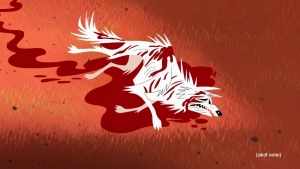
Jack seems to be the only human for miles in the beginning of season five. Jack’s solitary nature is amplified by the image of the white wolf which repeatedly appears. “Episode XCIII” makes a point of cutting between shots of Jack and the wolf fighting their respective battles, which in the end leave them both battered and seemingly near death. Both Jack and the wolf are survivors by nature, but they fight in battles in which no one can emerge a winner.
The Jack of season five blurs the line between exile and self-imposed seclusion. Since most people fear being left alone for extended periods of time, the subject of solitude is often dismissed and avoided at all costs. However, Jack’s ability to be alone is one of his greatest strengths. What might drive anyone else insane, Jack takes in stride. He may not always enjoy it, but he endures it incredibly well. It’s essential to the maturation of his character.
When Jack and the white wolf come face to face in “Episode XCIV,” it’s to take refuge from the violent world around them. After being badly injured, they both manage to crawl into an abandoned cave to respectively “lick their wounds” so to speak. They eventually share a meal and even warmth. Despite the popularity of the phrase “lone wolf,” wolves are not exactly solitary creatures by nature. Just like their evolutionary descendants, dogs, wolves are incredibly social animals. They thrive in packs, which increases the chances of successful hunts. Wolf packs are also built upon a hierarchy of dominance and submission, not too dissimilar to the strict codes of respect in feudal Japan.
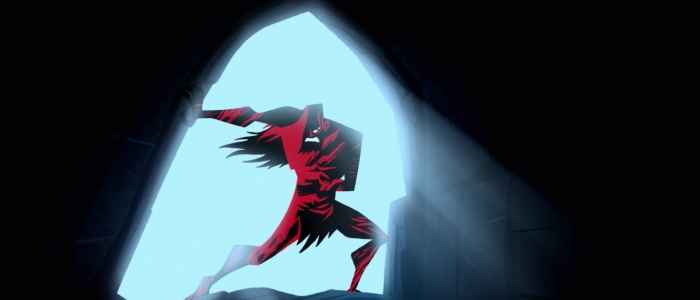
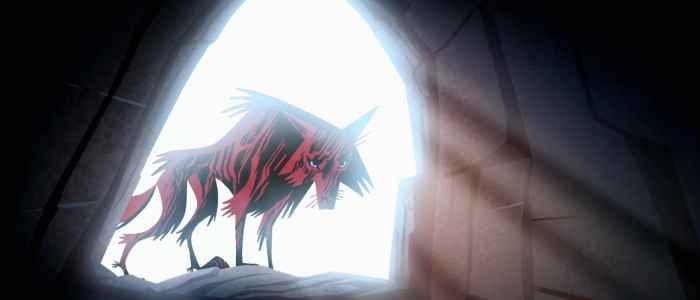
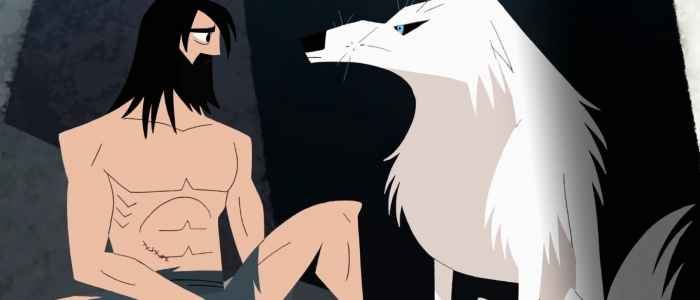
Still, once Jack and the wolf recover, they go their separate ways. Unlike the Creature of “Episode XXXIII,” the wolf doesn’t decide to tag along for the ride. Dogs may be “man’s best friend,” but that doesn’t mean a wolf is. People are only ever just passing by each other. Individuals occasionally walk side by side (and it’s a great relief and a joy when this happens), but the sad truth is that even in relationships one remains alone. Jack and the wolf come together when they need each other and quietly part when their company is no longer necessary for the other’s well-being.
A lone wolf is a displaced one, just as Jack is. Being thrown out of his own time zone has had serious existential consequences for Jack. Much like the white wolf, Jack somehow walks away from battles he knows he should have lost. The white wolf is shown to be living outside of its usual habitat. With its white pelt, it would be better suited to a landscape with a similar color scheme. A snowy, arctic one perhaps. Jack and the wolf are ghosts wandering around in a world that’s no longer their own. Just as good company can serve as a respite from the maddening reality of day-to-day life, solitude actually forces one to face reality head-on.
Transitory Bonds and Depictions of Solitude
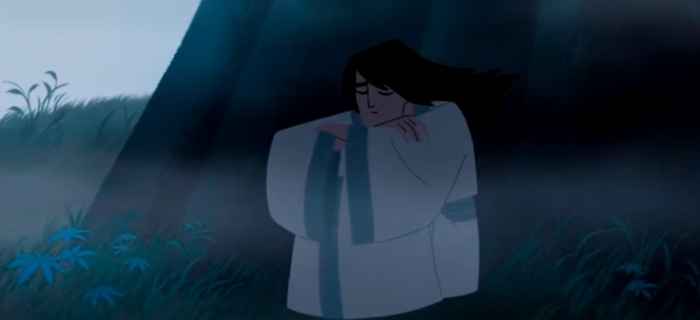
For much of Jack’s journey, he never seems too lonely. Alone, yes. The melancholy of his situation always reaches him, but it never truly crosses into the territory of loneliness. By the series finale, after triumphantly vanquishing Aku, Jack loses a great love in his life. Viewers expect Jack to walk away as the victor . . . to be the hero and “get the girl” too. That’s the typical conclusion to a hero’s narrative arc. But none of that really happens.
A hero is supposed to earn respect and attain what he’s supposedly deserved all along. Samurai Jack manages to subvert viewers’ expectations of what a “happy ending” entails. If Samurai Jack is about the maturation of its protagonist, then it cannot end in the way he (or we for that matter) would have hoped. Maturation often entails being repeatedly disappointed and having to constantly reevaluate one’s world-view. As important as happiness is to one’s well-being, suffering and sadness are often greater teachers (which lends itself to the profundity of Samurai Jack‘s conclusion). Life will always find a way of refuting one’s desires.
That isn’t to suggest Jack doesn’t form relationships or even close bonds along the way. In previous seasons, Samurai Jack was a heavily episodic series where few narrative events directly linked to Jack’s subsequent adventures. To watch the satisfying narrative arc of season five, one must watch the season chronologically from start to finish. That’s the driving force. It intensifies any relationships Jack may have with characters that spill over into subsequent episodes. Cue Ashi.
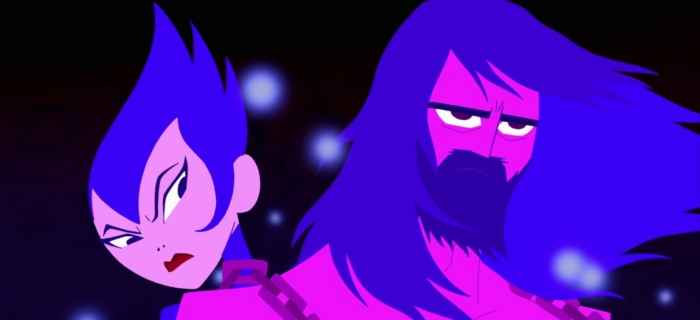
Despite the presence of other characters, Jack and Ashi spend much of the season as if they were trapped on a deserted island together and forced to reconcile their differences if they’re to survive. This close proximity increases the likelihood of endearing one individual to another, marking the subtle change from tension to affection. They are forced to relate on a much more personable level. Not as a samurai and his designated assassin, but as two human beings.
It puts two modes of relating to other people at odds with each other. Ashi has spent her entire life so far surrounded by others, only recently losing her long-term allies and being forced to accompany her greatest enemy. Jack has spent a large portion of life wandering on his own and is only recently forced to contend with a long-term companion. Aku (and thus Ashi as well) surrounds himself with others but is ultimately alone whereas Jack is a loner who actually has a great many friends whom he can rely upon. Aku and his descendents’ connections are based on exploitation and self-interest. Jack’s connections are more deeply founded because he does not demand or even expect their friendship.
Nevertheless, the friends Jack makes along the way are made to seem transitory. They are checkpoints to measure his growth as a man (not individuals with which to form long-term relationships). The people of Aku’s future are hypotheticals. This is not to suggest his relationships are superficial by any means . . . only fleeting by nature. His fealty first and foremost is to the ones left behind in the past, not to those part of a future he never asked for. This realization appears to have dawned on him at the start of season five, when Jack goes out of his way to help strangers in distress but behaves more coldly and distant than he once did. In “Episode XCII,” he abruptly leaves those he saves without even waiting for a simple “thank you” in return.
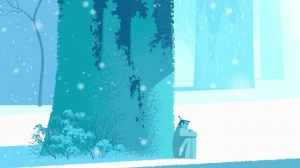
In the revised title credits of season five, Jack reminds viewers that he’s trapped in limbo, a purgatory of Aku’s making. Perhaps for the first time, Jack realizes how isolated his existence is. He lives outside his natural time zone and seemingly outside the bounds of mortality as well. It’s like being a god, but with none of the perks. It’s the first time viewers are forced to reconcile the fact of Samurai Jack‘s previous loose, episodic format. Jack has been stuck in a seemingly endless time loop, always “almost” defeating Aku . . . always “almost” getting home . . . but forced restart over and over again. Even when Jack learns to “jump good” and catch Aku by surprise in “Episode XIV” or actually jumps into a time portal as he does in the flashback of “Episode XCVIII,” he always ends up right back where he started.
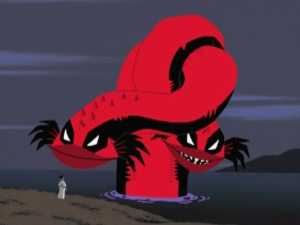
Jack is used to repeatedly reaching dead-ends in his journey. In the first section of “Episode XV,” Jack is led to believe that solving a monster’s riddle will be the key to his finally getting home. This monster is the two-headed beast known as the Worm, with one head claiming to only spout the truth and the other nothing but lies. Picking the correct one will lead Jack home . . . or so it seems. This appears to be Jack’s saving grace. However, by the end of this interaction, viewers find out that this riddle-solving Worm with wish-granting properties is just a ruse. It’s simply a way of reeling in a free and willing meal. To Jack’s dismay, this Worm has no more power to get Jack back home than he does. Much like the Hydra, Jack cuts down one obstacle only to find more in its place. Samurai Jack is one long lesson on perseverance in spite of continual frustration.
This continual frustration may be an expression of Samurai Jack‘s vision of loneliness. Loneliness isn’t something that can truly be abolished. It can only be assuaged and put off for another day when it will inevitably return when one least expects it. There is an aching loneliness in Jack’s solitude, but also a great beauty to be found in it as well. Angelica Jade Bastién in Vulture.com‘s “Samurai Jack Was TV’s Most Poignant Depiction of Loneliness” examines the show’s nuanced exploration of solitude. As Bastién notes, the series dismantles that woefully sunny notion that so-called happiness can be sustained “[w]ith the right factors – the love of a partner, community, work” (Bastién). 13 Jack falls in love with Ashi, builds a grand network of supporters from those he has helped over the years, and upholds his duties as a samurai warrior. He has all of these ingredients for the “happiness recipe” but he remains perpetually alone. These ingredients can never fill the emptiness of existence. They only serve to cover up the pit and make one forget it’s there for awhile.
Any loneliness Jack may feel is built into his character from the beginning of the series. As Bastién notes, Jack’s “traditional, antiquated Japanese garb . . . is a constant reminder that he doesn’t belong in this time and place” (Bastién). 14 It’s also the inevitable symptom for workaholics everywhere who thrive on distraction to function in life. Jack’s nature is of “those [who] pursue [their] goals with such dogged determination the rest of life often becomes an afterthought” (Bastién). 15 The introduction of Ashi is the catalyst for the change in Jack’s mindset by the final episode.
The Female Transformation: From Seductress to Savior
Samurai Jack has been a predominantly male-dominated universe until season five. The series certainly isn’t a “boys only club,” but any female presence has been minor at best. Many of Jack’s meetings with women in previous seasons have been less than satisfactory. Those interactions align more with the idea that women are dangerous distractions meant to dissuade a hero from his quest. The women Jack meets in previous seasons are less like maternal, guiding figures and more like sirens or enchantresses that lead wanderers off the chosen path and possibly to their deaths. If Jack is to have any hope of defeating Aku, Samurai Jack makes it clear that he would be better off if he steered clear of potential femme fatale figures.
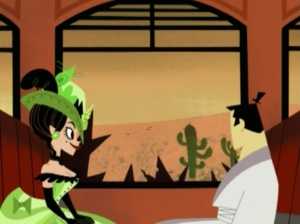
Jack is actually better equipped than most when it comes to dealing with female attention. His upbringing has ensured that he’ll always try to behave in the most gentlemanly way possible. Sometimes Jack is just altogether oblivious of female attention. Other times, he is notably uncomfortable and wary of it. In “Episode XXIX,” when a female bounty hunter named Josephine tries to use her persistent charm and powers of seduction on Jack, it requires more than a little patience and convincing for him to get the hint and follow her lead. Jack is always polite and courteous, but he largely misunderstands her intentions (romantic or otherwise).
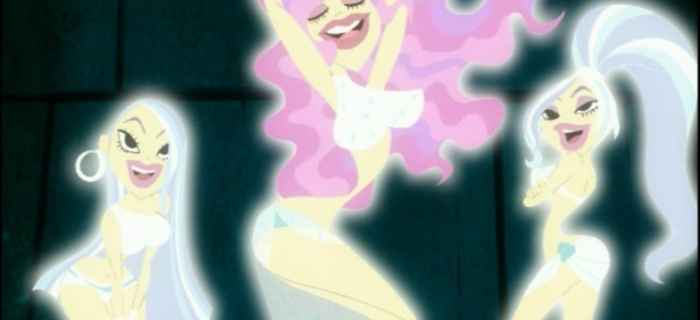
“Episode XLVI” is where female interference has potentially fatal consequences. Sirens manage to steal both Jack’s sword and his own name from him. These creatures are most similar to mermaids, mythical creatures who lure desperate and unsuspecting sea-faring men with the promise of a female fantasy. The three sirens of “Episode XLVI” don’t devour those enticed by their singing, but they are keen on taking their loot and making sure their victims are so enamored they forget all about it.
Their appearance is similar to that of Mara’s three daughters in Buddhist philosophy when they “use dance, song, music, and sweet talk as their arsenal to generate lust in the Buddha’s mind” (Guruge). 16 In that scenario, Gautama Buddha proves the strength of his mind by never being swayed by all the temptations Mara casts in front of him. In “Episode XLVI,” Jack has to rely on the help of the Scotsman to get him out of this predicament. If not for the Scotsman, Jack might have been trapped in a perpetual state of amnesia.
In “Episode XLIX,” during the “Spring” section, one expects something positive must happen from that title alone. What evil could possibly occur during the springtime (aside from allergies, of course)? He enters a mysterious grove covered in vines that suddenly flower as he walks by and meets a beautiful woman who continually praises Jack for his continued bravery and selflessness. She seems to understand Jack’s struggles despite their never meeting before and begs him to just relax and stay with her for awhile. Contrary to the sexy siren figures of “Episode XLVI,” “Episode XLIX” offers Jack a glimpse at what a maternal, nurturing female presence can offer a weary warrior. She appears to be a warm person who offers Jack a refuge from the madness of an Aku-filled future. Rather than try to steal his mind and possessions away from him, she offers him the chance at that ever-elusive notion of a “break.”
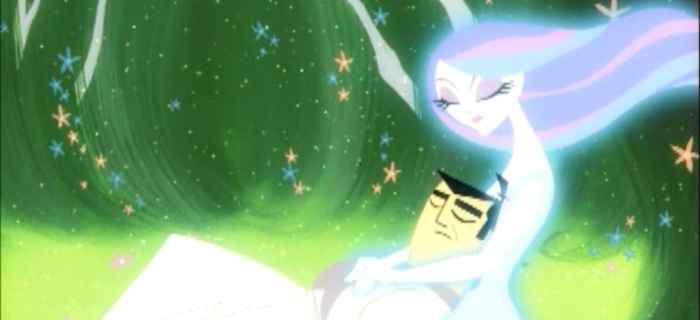
She professes to simply care for him, but her insistence at winning him over make her a threat. Jack must have his guard up at all times. According to Ed Grabianowski in “How Samurai Work,” some samurai “master[s] would strike [their] students with a wooden sword at random times throughout the day and night” to ingrain this message in the minds of aspiring warriors (Grabianowski). 17 Jack could have really used such a shock. This lulling him into an almost catatonic state is reminiscent of the Lotus-eaters. And much like Calypso, this nymph has designs on making Jack’s Odysseus stay forever. To forget his quest. To forget the damage Aku’s done. To forget his home and his family. That’s something Jack can never afford to do.
Because of their connections to Aku, the character of Ikra in “Episode VI” becomes somewhat of a precursor to Ashi in season five. However, any possible romantic interest between Jack and Ikra is minimally explored. Jack is likely glad to have some female company for once in “Episode VI,” but his attentions are elsewhere. He’s a man who always remains focused on his central mission of defeating Aku.
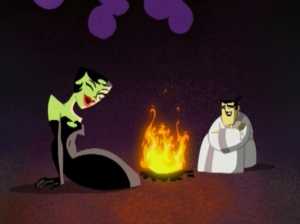
What briefly endears Ikra to Jack is that their mission seems to be the same one. Ikra’s spins a tale for Jack about her personal quest to rescue her father from Aku’s imprisonment. He never questions the validity of her plight. Because of his decency, he remains naively unaware of her true intentions. He also can’t fathom why the jewel might reject their supposedly “pure-heartedness,” never realizing Ikra’s ulterior motives have cost him his trip back home. When Ikra is revealed to be Aku in disguise, there’s little to dispute that in terms of her similarity to the master of darkness. The warning from the shopkeeper, Ikra’s shape-shifting like Aku to defeat the jewel’s guardian, her destroying the jewel (which is counter to her and Jack’s shared interests), and her color scheme of black, green, and red (the same as Aku’s) all start to add up to a frightening conclusion. Aku essentially appeared in drag to exploit Jack’s good nature and humiliate him yet again.
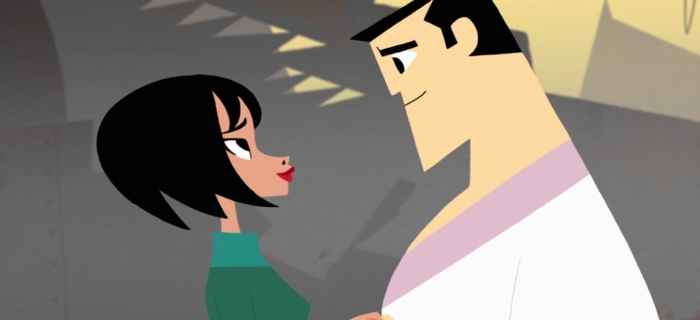
The introduction of Ashi’s character alludes to Jack and “Ikra’s” brief acquaintance. Jack and Ashi’s “dinner by a campfire” scene is reminiscent of one Jack shares with Ikra. Jack and Ashi later operate as a team with shared goals, just as he and Ikra did. However, season five makes a point of showing how these two encounters diverge. Ashi’s character marks the narrative transformation from women as seductive distractions to allies, nurturers, and saviors. Ashi isn’t a poser, a mere facade of these qualities, like others were before her. She becomes not only an ally to him but the key needed to defeat Aku.
To be fair, Ashi never starts off as a distraction in the first place. She’s more aptly described as an impediment. However, she’s not an obstacle Jack must overcome through willpower. She’s someone who allows him to be more vulnerable than he was in previous seasons. This may sound like a weakness, but vulnerability is exactly what Jack needs.
That isn’t to suggest Samurai Jack has turned sentimental and cloying by adding a stereotypical boy meets girl plotline. So that’s all Jack needs in his life? A good woman? Hardly. He doesn’t meet the “love of his life” and everything is suddenly okay. The conclusion of Samurai Jack isn’t a simple “love conquers all” story. In fact, love doesn’t conquer anything at all. Conquering pertains to Aku’s mindset, not Jack’s. In order to defeat Aku, Jack must actually learn to submit himself . . . because to overcome Aku, Jack actually needs his help to do it.
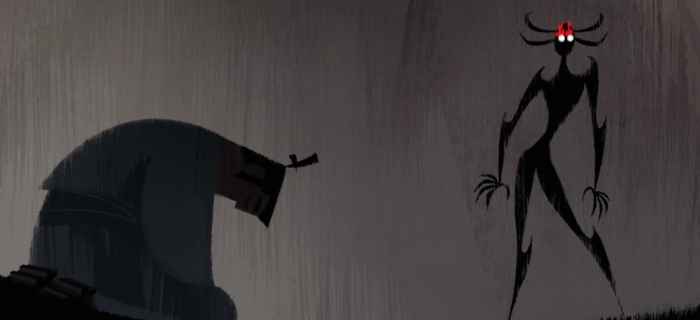
Compared to his time with Ikra, Jack doesn’t naively assume Ashi has his best interests at heart. She does belong to an Aku-worshipping cult with designs on killing him after all. He can’t simply brush that one off even if he wanted to. They both know where the other stands in terms of thought and intention from the beginning. There’s no possibility for secrecy, heightening the possibility of true intimacy developing between them. Jack decides to take care of her and protect her despite her initial ill-will towards him. He knows this goes against any common sense, but he’s determined not only to be a good person but to enlighten Ashi. She’s simply confused and misguided. It’s his duty to show her she’s mistaken and guide her from there.
For a man who’s lost the ability to age, there’s an urgency in his and Ashi’s romance. Both have been deprived of affection for a long time. It shouldn’t be a surprise that their relationship escalates the way it does. When the daughters of Aku are first exposed to the concept of hormonal desires, they can’t recognize it. In “Episode XCIV,” they are out in the woods hunting Jack and approach two deer in the middle of courtship, but are puzzled by the encounter. They are under the impression that these animals are Aku’s creations, ones which root out weakness and extinguish it (much like themselves). When the stag comes close and nuzzles the doe rather than destroy her, it’s an act that goes beyond their level of understanding. Most individuals only ever see what they want to and what they’ve already learned to recognize. The scope of understanding for the daughters of Aku is limited to competition and violence only.
If Jack is associated with the image of a wolf, does that mean Ashi (as a daughter of Aku) is then associated with a deer? A deer hunting a wolf? That’s certainly new. This reversal of roles may point to Aku’s pervasion of nature. It reveals to viewers early on that Ashi isn’t meant to be hunting Jack. It exposes Ashi’s mistake, by making their destined positions of hunter and hunted obvious. However, Jack doesn’t behave the way a wolf should. He should be out hunting but he’s hiding instead. It’s a signal for Ashi that the samurai is not what he appears to be, not the man her mother warns her against. She has nothing to fear from him. Perhaps this union between predator and prey has connections to the Bible passage that describes a similar, unusual scenario. Whatever the case may be, Jack and Ashi’s relationship is forced to accelerate because of the hostile environment, a pressure-cooker of circumstances that make Aku and Jack’s final confrontation imminent.
This predator-prey dynamic reveals how romance tends to work as a constant dance between dominance and submission. This means there’s also a thin veil between dislike and like. After being filled up with so much hatred for so long, it’s only natural for Ashi to feel a staggering amount of affection for Jack once her feelings about Aku are turned upside down. Her emotions inevitably swing in the opposite direction. Jack, on the other hand, had been emptied of any overpowering emotions whatsoever. It is because he initially neither loves nor hates her that his compassion towards her is sincere. He is not motivated by feelings in either direction. Upon saving Ashi’s life, Jack’s primary concern is showing her the truth and looking out for her well-being. What could be more attractive than care given freely without self-interest?
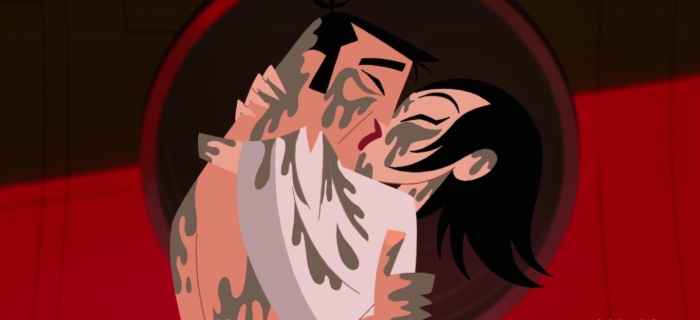
Negotiating Light and Darkness
Aku continually reappears because one cannot have light without darkness. In “Episode XXXVII,” also known as “The Birth of Evil,” not even the gods can eradicate the darkness completely. The gods are engaged in a battle against a darkness spreading across the universe, but one little shred escapes their notice and plummets to Earth. That little scrap of nothing, which seems like no big deal at first, becomes one of the most fearsome beings that’s ever ravaged the Earth . . . Aku. Even when Jack’s father, the Emperor defeats him, Aku swears it won’t be the last one sees of him and he makes good on his promises. If not even the gods can contain Aku, how can Jack (one lone mortal) be expected to?
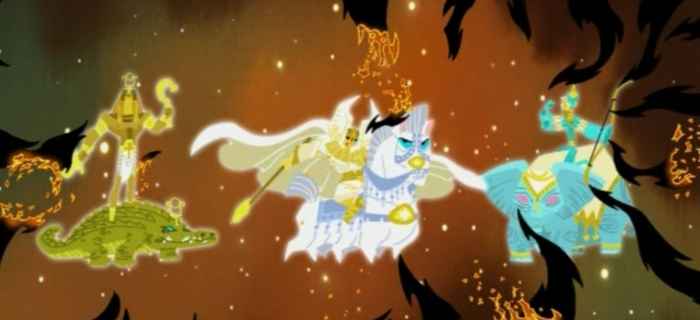
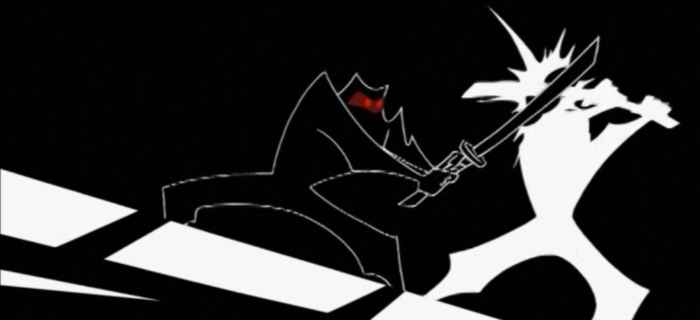
That doesn’t mean darkness always ends up winning though. Samurai Jack has tackled this subject, the battle between darkness and light, before. In “Episode XL,” Jack must defend himself against an assassin trained in a similar style of martial arts as himself. His opponent, a ninja, is someone who, like Aku himself, relies upon the darkness. What this ninja doesn’t realize is that Jack can fight like a ninja too, but relies on light rather than darkness.
The episode shows that despite Jack being able to match the ninja in terms of technique, light is a more limited resource than darkness is. Light is like a candle used to light up a room. It’s rarely blindingly bright. It provides warmth and lets one see more clearly, but it’s also something that can be easily snuffed out and swallowed by shadow. This is why Jack only has a limited amount of time to defeat this ninja, whereas the ninja has multiple opportunities to stealthily execute Jack.
According to Kallie Szczepanski in “The Ninja of Japan,” ninja were sometimes “disgraced samurai” or lower-class individuals “who learned to fight by any means necessary for their own self-preservation” (“The Ninja of Japan”). 18 This sounds like something Aku would definitely be on board with. In other cases, a ninja would be used to complete tasks that a samurai would be forbidden to commit (“The Ninja of Japan”). 19 Even though Aku is the farthest thing from a samurai in this scenario, the act of hiring other people to do one’s dirty work does ring true for him. If Samurai Jack were to be completely historically accurate, had Jack truly disgraced himself and backed out of committing suicide he might have no choice but to become a ninja instead, continuing the cycle of darkness to light and so on.
Darkness is often equated with negative qualities (death, fall/winter, corruption) and light (life, spring/summer, purity) with positive associations. However, the battle between light and darkness is not always as clear-cut as that. If one looks at the yin and yang symbol of Chinese philosophy, for example, white and black do not necessarily mean good and evil respectively. Much like the changing of seasons, they simply correspond to different aspects of nature and complement each other. Duality is not something to fight against or even overcome. A fight between light and darkness only creates an unnecessary disunity and civil war between opposing (but necessary) states of being.
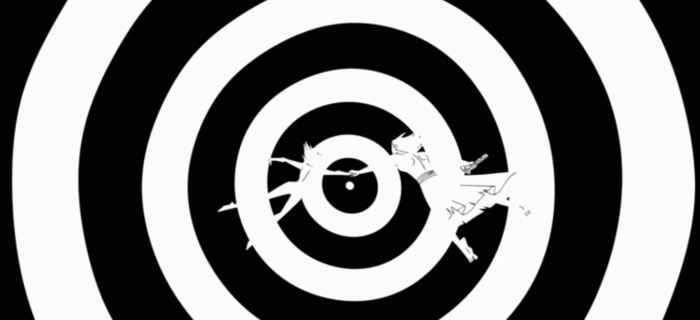
Perhaps this explains the change brought by Jack and Ashi’s romance in the final season at its core. Continually fighting against Aku has done nothing for Jack in terms of accomplishing his mission. Jack’s love for Ashi is a way of uniting light and darkness. By falling in love with a spawn of Aku, he surrenders to and makes peace with aspects of Aku he once loathed. Ashi does the same with her love for Jack by reconciling with the more compassionate and assertive aspects of her character she was once forced to suppress. When Jack and Ashi return to the past, the strips of white and black in the time portal reflecting off their bodies make this union between light and darkness clear.
Cyclicality
Cyclicality is perhaps an obvious topic in Samurai Jack. It’s a series that concerns time travel and remedying the past after all. The final episode of the series completes the events of the very first episode. The events of all subsequent episodes are what only Jack can be cognizant of. To everyone else, they are events that might have happened had history taken a dark turn . . . but never did.
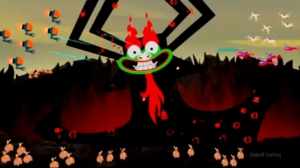
“Episode CI” certainly offers a sense of coming full circle so to speak. Seeing all of Jack’s acquaintances from long ago team up against Aku during Jack’s greatest hour of need in the series finale should be tremendously satisfying for any Samurai Jack fan. These efforts to help Jack are also sacrifices since not all of them appear to escape Aku’s clutches alive.
When Jack realizes Ashi’s fate, cyclicality is also at work. In the first episode, Aku stole Jack’s family and homeland (his past) from him and in the finale Aku steals Jack’s wife-to-be (his future) from him. Ashi can’t be with Jack if Aku doesn’t also exist. From beyond the grave, Aku manages to spite Jack once again. It’s unlikely there could have been any other resolution. Ashi once begged for Jack to kill her, afraid of what she might do under Aku’s control. Unlike “Episode X,” where Jack frees a cursed Viking from his suffering, this is a wish Jack is unwilling to grant. It’s a horrible case of Catch-22.
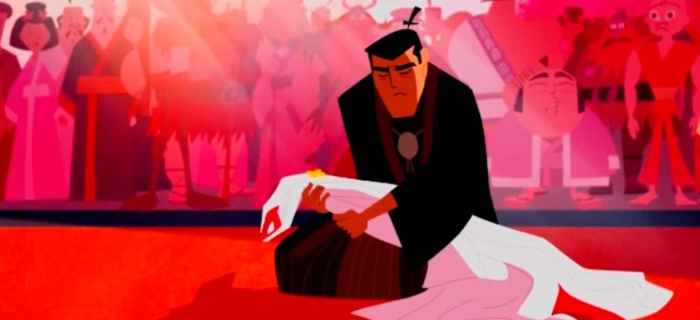
Jack likely couldn’t have killed Aku in the future to be with Ashi either. Jack would be unwilling to allow Aku to reign for as long as he did just for the sake of his own personal happiness. Also, if Ashi were allowed to exist in the future with Aku dead, it’s more likely Aku would reappear at some point in the distant future yet again. Ashi may have demonstrated a newfound control over the aspects of Aku within herself, but she may not be able to control Aku’s presence entirely. If she and Jack had started a family together, would Aku have been able to infect Jack’s bloodline as well? Ashi might even feel the need to kill herself for fear Aku would return, which would be even more tragic. As long as Ashi lives, there is the risk that Aku might return.
Before one succumbs to complete despair, it’s worth noting that there are a few images that tie Jack and Ashi together no matter what. When Jack serves as Ashi’s tour guide, showing her that it’s Aku who is the true blight on the world, he shows her the symbol of Aku’s power. According to Jack, Aku left a single tree in bloom as evidence of his world domination. To destroy everything would defeat the purpose of Aku’s cruelty. It would remove the possibility of people’s longing for a world without Aku. That unfulfilled desire is what gives Aku satisfaction. If the world’s always been terrible, it seems like it will always be that way and there’s no way of changing that. People would be more likely to resign themselves to Aku’s world which does nothing for Aku’s ego.
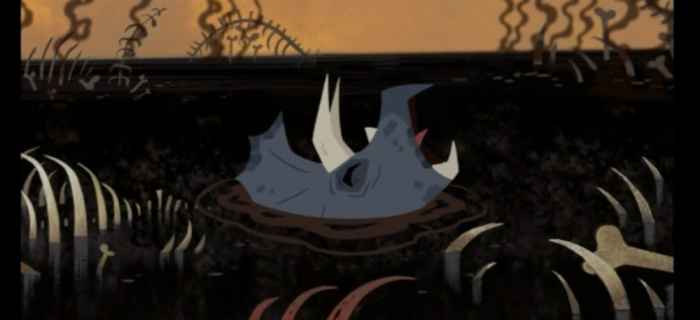
This single tree is a direct reversal of the events in “Episode XXXVII,” where just a single remnant of darkness escapes the notice of the gods, the enforcers of good. In that episode, darkness stays dormant and festers. It grows. It never stays still for long. From one tiny scrap of nothing, something fearsome emerges. The tree, the only element of goodness left, does not operate in the same way. It’s not a weed or a patch of ivy that overtakes every living thing in its path. It somehow flourishes on its own without ever being invasive.
This tree isn’t just a symbol of longing and despair. It’s also a symbol of hope. Metaphorically speaking, Jack is that blossoming tree in the middle of an arid, deserted landscape. He represents the only chance the world has left of being restored. He’s the one bit of goodness left that Aku can’t seem to get rid of no matter how hard he tries. In the last few moments of the final episode, viewers see this tree once again. The landscape around Jack is now flourishing, but this time Ashi isn’t around to see it. That desolate scenery has disappeared and Aku along with it. Jack’s surrounded by beauty but at first unable to see it. Despite Jack now being alone beneath the tree, this scene is a poignant one rather than sorrowful.
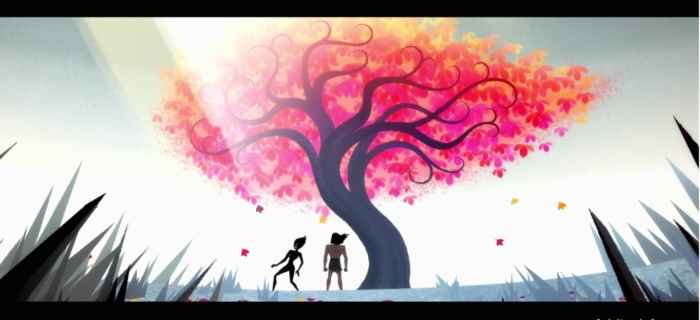
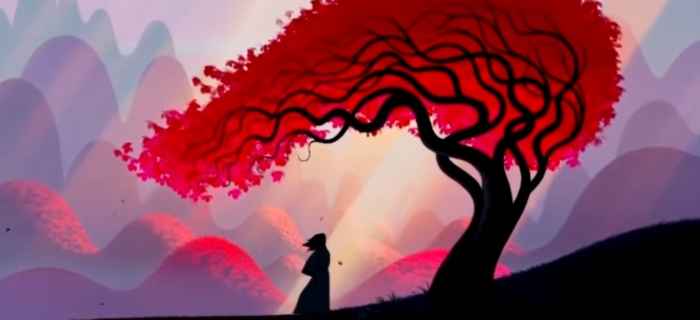
Ashi and Aku’s existence are so bound up with each other. Their existences can never be separated (however much Jack would like them to be). But if Aku is a being who seems to always reappear somehow. . . perhaps the same is true for Ashi. The romance between Jack and Ashi is a mature portrayal of love, one that is steadfast and enduring (much like the tree Jack takes shelter under). However, mature love isn’t a stagnant thing either. It changes, grows, and evolves. It can even exist without Ashi physically by Jack’s side.
The image of a ladybug unites them as well. This ladybug appears first during Ashi’s childhood when she is reprimanded for her innate curiosity. There it seems to symbolize something similar to what the tree does, a small remnant of the natural world that Aku has been unable to corrupt. As far as Ashi’s mother is concerned, the ladybug represents something forbidden. It’s as if it were the “forbidden fruit of knowledge” in the Bible. Like any child would, a young Ashi delights in any new experience the world has to offer her. Simply playing, as a child is apt to do, is an earthly pleasure that’s sinful to enjoy.
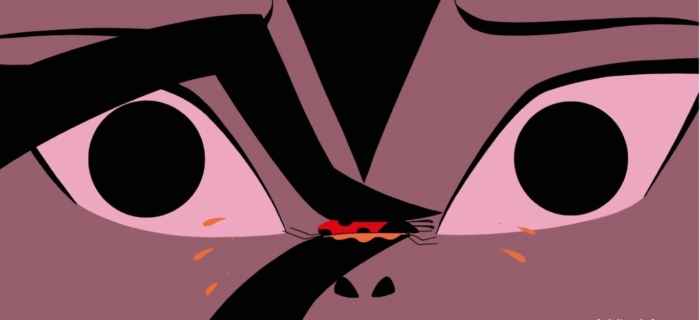
It might be worth noting that ladybugs are predatory insects. To humans, they might seem cute and delicate but like the daughters of Aku they know how to hunt. The species of ladybug depicted in the series, ones who are red with black spots and white splotches and are most likely found on a nearby leaf, most closely resembles Aku’s color scheme. The term “ladybug” is technically a misnomer (there are male ladybugs after all, as anyone who’s seen A Bug’s Life will remember), but it does connect with the feminization Aku’s image endures in the final season. It signals the introduction and the need for a greater female presence in the show, hence the female Aku cult and Aku’s daughters.
The ladybug’s presence subtly transforms Aku’s image from one of outright menace into a more palatable form, subconsciously merging Aku’s colors with an aspect of nature in viewers’ minds . . . a harmless ladybug. It explains why Jack can have his emotions swayed by someone who’s so closely related to Aku but never realizes it for himself. Maybe Aku isn’t an aberration of nature, an unfortunate accident, as viewers have been led to believe. Perhaps this is a signal that Aku’s reign cannot last forever, however much it may seem as though this has already been achieved. Nature changes and is engaged in a constant turnover between living and dying, which can only mean Aku must die at some point as well. He’s certainly overstayed his welcome already.
After Ashi’s childhood encounter, the ladybug reappears during a confrontation with Jack. This is where Ashi must choose to listen to Jack or return to the path her mother has already laid out for her. She is given a choice between killing Jack when his back is turned and he’s at his most vulnerable . . . or laying down her weapons altogether. To say this is a difficult decision for her to make would be a serious understatement.
Since the ladybug’s connection with Aku (which means Ashi as well) has been established, Jack’s treatment of the ladybug becomes incredibly important. Ashi seems bewildered when Jack allows the ladybug to rest on his hand and then lets it fly away. It’s against Aku’s nature to just let things go. Ashi’s entire upbringing has consisted of suffocating possessiveness, the suppression of self-expression, and violence. Jack’s compassionate treatment of the Aku-colored insect not only reveals an entirely foreign way of being than Ashi’s used to but it assures viewers that he will not even bear a so-called enemy ill-will either.
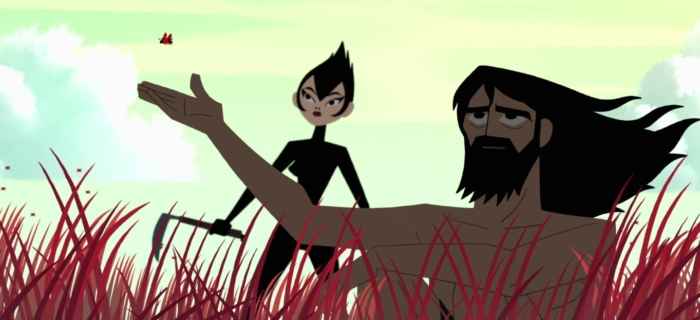
The ladybug appears for the last time when Jack is left alone to mourn the loss of Ashi. As trite as it may sound when put into words, the ladybug’s existence suggests that there’s always a sliver of beauty when circumstances seem at their most bleak. It’s also a sign that just as Jack can never forget her, Ashi can never truly leave him. The ladybug, likely invited by Jack’s calming presence rests on Jack’s hand once more before flitting off someplace else. Jack lets the ladybug go freely, not trying to entice it to stay with him or trap it somehow. Not even now when he seems at his loneliest despite having finally fulfilled his quest.
When it comes to the powerful experience love provides, it’s all too tempting to try and hold onto forever as if one owned it. This is where the ladybug makes its final symbolic transformation. Previously, the ladybug’s colors united the disparate concepts of Aku and nature but now it seems to include the concept of love as well. To use the name “Aku” and the word “love” in the same sentence seems blasphemous . . . but it’s actually not as far-fetched as it may first appear. Aku himself certainly doesn’t embody anything remotely close to love, but certain qualities he possesses are not at all dissimilar. Aku’s ability to shape-shift and resurrect himself when least expected is a quality love possesses as well.
That’s the paradox love presents Jack with . . . how can one who finally feels fulfilled (by finally completing his mission and regaining his sense of self) feel so empty? Viewers will likely feel devastated for the sake of Jack’s personal happiness. By all accounts, Jack has proved himself worthy of a “happy ending” to make up for everything he’s been through. Despite this gut feeling, viewers will also likely realize the inevitability of a slightly more subdued conclusion. He does get a “happy ending” of sorts, though it may not always be easy to see that.
Romance alone has the appearance of relieving one of suffering and loneliness forever. That surge of joy is supposed to “complete” him, but it doesn’t. Not even in the series finale does Samurai Jack rely on a love interest to propel the narrative forward or to inject some sense of higher profundity to Jack’s journey. Feeling empty-handed is a grim reality Samurai Jack adheres to in addition to its life-affirming intentions. Love may not appear in the ways one expects (it rarely does), but it can never truly desert the individual who allows it space to exist. Jack quietly gazes at the new world around him in the final few shots of the last episode. Jack’s world is blanketed in a thick, impenetrable gray fog. Aku’s colors are introduced to this bleak landscape via the ladybug and soon enough the fog begins to lift seemingly out of nowhere. Poignant music swells. No words are spoken. Viewers can only sense the shift in mood from the change in color and the slightest hint of a smile on Jack’s face. As Samurai Jack knows so well, any wisdom to be gained in life is usually uncovered without the need for words.
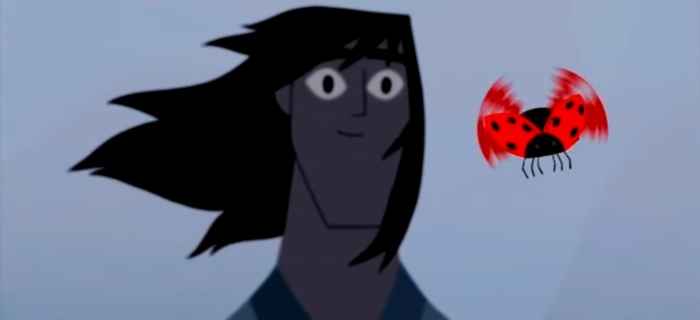
Conclusion
The upgrade from Cartoon Network to Adult Swim was definitely a sign that the series was prepared to amp up its level of maturity, perhaps to match the current age of fans who grew up watching Samurai Jack when it originally aired. If you were expecting penis jokes, sexual innuendo, suggestive metaphors, and blood-soaked sword fights then you sure got it. However, if you were also expecting Samurai Jack to tap into the other definition of “mature” for the newest and final season of Samurai Jack, you shouldn’t feel disappointed.
If we’re being honest, Samurai Jack has always been a “mature” series. Maybe not in THAT way, but it has always tackled issues well beyond its expected target audience. The series’ insight into the amount of pain and suffering Jack endures caters to more matured minds than it ever does to kids. Nevertheless, it also casts an enviable role model in the character of Jack. He’s someone for kids to look up to and be inspired by. Long-time fans of the series likely have complicated feelings regarding this final season. Glad to see the return of Jack one never saw coming after the series’ initial, abrupt non-ending. At the same time, saddened by the realization that it really is the end this time. There’s no replacing Samurai Jack, that’s for sure. It’s clear that the show’s never been juvenile. Genndy Tartakovsky made that clear from the very first season:
Genndy Tartakovsky quote, taken from Samurai Jack season one DVD jacket: “Conan the Barbarian. The Good, the Bad and the Ugly. Star Wars. Blade Runner. Seven Samurai. These were the films that I grew up on, and they were my inspiration as a kid and as an adult. Developing and making Samurai Jack, they were always on my mind. My goal was to make a show that I would enjoy whether I was a kid or an adult.” 20
Works Cited
- “Episode XXVII.” Samurai Jack. season three. written by Chris Reccardi and Aaron Springer, directed by Robert Alvarez and Genndy Tartarovsky, Warner Brothers Home Video, 2006. DVD. ↩
- “Episode C.” Samurai Jack. season five. written by Bryan Andrews and Genndy Tartakovsky, directed by Genndy Tartakovsky, Toonami, AdultSwim.com, 2017. ↩
- Bastién, Angelica Jade. “Samurai Jack Was TV’s Most Poignant Depiction of Loneliness.” Vulture.com. 26 May 2017. Web. http://www.vulture.com/2017/05/samurai-jack-was-tvs-most-poignant-depiction-of-loneliness.html ↩
- Season five opening sequences. Samurai Jack. directed by Genndy Tartakovsky, AdultSwim.com., Toonami, 2017. ↩
- “Episode XCIV.” Samurai Jack. season five. written by David Krentz and Genndy Tartakovsky, directed by Genndy Tartakovsky, Adultswim.com, Toonami, 2017. ↩
- “What is Seppuku?” Andrews, Evan. History.com. Web. 14 January 2016. http://www.history.com/news/ask-history/what-is-seppuku. ↩
- “What is Seppuku?” Andrews, Evan. History.com. Web. 14 January 2016. http://www.history.com/news/ask-history/what-is-seppuku. ↩
- Grabianowski, Ed. “What is a Samurai?” HowStuffWorks.com. http://people.howstuffworks.com/samurai1.htm. ↩
- Grabianowski, Ed. “What is a Samurai?” HowStuffWorks.com. http://people.howstuffworks.com/samurai1.htm. ↩
- Grabianowski, Ed. “What is a Samurai?” HowStuffWorks.com. http://people.howstuffworks.com/samurai5.htm. ↩
- Grabianowski, Ed. “What is a Samurai?” HowStuffWorks.com. http://people.howstuffworks.com/samurai5.htm. ↩
- “Episode I.” Samurai Jack. season one. written by Paul Rudish and Genndy Tartakovsky, directed by Genndy Tartakovsky, Warner Brothers Home Video, 2004. DVD. ↩
- Bastién, Angelica Jade. “Samurai Jack Was TV’s Most Poignant Depiction of Loneliness.” Vulture.com. 26 May 2017. Web. http://www.vulture.com/2017/05/samurai-jack-was-tvs-most-poignant-depiction-of-loneliness.html ↩
- Bastién, Angelica Jade. “Samurai Jack Was TV’s Most Poignant Depiction of Loneliness.” Vulture.com. 26 May 2017. Web. http://www.vulture.com/2017/05/samurai-jack-was-tvs-most-poignant-depiction-of-loneliness.html ↩
- Bastién, Angelica Jade. “Samurai Jack Was TV’s Most Poignant Depiction of Loneliness.” Vulture.com. 26 May 2017. Web. http://www.vulture.com/2017/05/samurai-jack-was-tvs-most-poignant-depiction-of-loneliness.html ↩
- Guruge Ananda W.P. The Buddha’s Encounters with Mara the Tempter: Their Representation in Literature and Art. AccesstoInsight.org. 5 September 2017. Web. http://www.accesstoinsight.org/lib/authors/guruge/wheel419.html ↩
- Grabianowski, Ed. “What is a Samurai?” HowStuffWorks.com. http://people.howstuffworks.com/samurai2.htm. ↩
- Szczepanski, Kallie. “The Ninja of Japan.” Thoughtco.com. 16 July 2017. https://www.thoughtco.com/history-of-the-ninja-195811 ↩
- Szczepanski, Kallie. “The Ninja of Japan.” Thoughtco.com. 16 July 2017. https://www.thoughtco.com/history-of-the-ninja-195811 ↩
- Genndy Tartakovsky quote. Samurai Jack. Season one. Warner Brothers Home Video, 2004. DVD jacket. ↩
What do you think? Leave a comment.

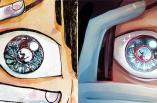


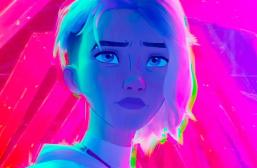
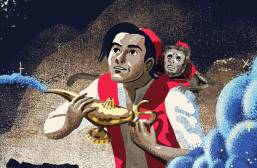

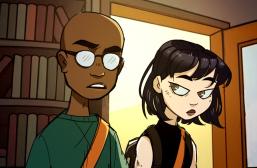


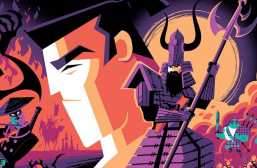
Grew up watching this and own every series. It is masterful storytelling combined with charming animation and a brilliant visual style.
The whole romance episode was a waste of time. Could have been used to flesh out the final battle a bit more and make jack and ashi relationship a bit more clever and in tone with the rest of the season, possibly clearing up some questions we had and a satisfying ending for all.
Samurai Jack is one of the greatest shows ever made. Across all genres. It was truly art in motion. It left such a heavy impact on me both as a child and an adult. I’ve never encountered a show that can accomplish such incredible storytelling with such a little dialogue. You can tell that ever single aspect no matter how small was so carefully thought out. It just oozes quality. Thank you thank you thank you to the team behind this gift.
What did you think about the ending?
Part of why the ending seemed unsatisfying is because it wasn’t designed to be from the start if jack’s ultimate goal is to travel back in time and hit Aku with his sword, and he nearly reaches a time portal in a whole bunch of episodes, then it was always the proximity to his final goal that kept him interesting. If your character comes close to his final goal nigh every episode, you lose something.
The end of Samurai Jack did not disappoint me. I think you need to understand that reason why Akku fails and Jack is finally able to win is because Akku doesn’t evolve and Jack does. Jack has changed and turned into a new person while Akku is doomed to stay in the past Ironically. So Jacks victory and defeat of Akku already happens the moment he defeats Jacks darker self and evolves. He already had his epic battle and metaphysical victory. The battle with Akku was just a simple step.I feel that this wasn’t conveyed as well as it should of had. But I still think that if you view it this way. To ending is much more satisfying.
The real reason why people aren’t satisfied is because every one had an unrealistic expectation. they wanted want something bigger and flashier and a more complicated duel of wits between Jack and Akku, But I think that wouldn’t have really worked either and would of been worse then what we got. What we got was the best we could of hoped for.
I’ll admit I felt the final stretch of season 5 was a tad rushed. Maybe if they had like two more episodes they could have fleshed things out a bit.
my biggest problem with the ending is that THEY ALREADY HAD A PERFECT ENDING WITH THE GUARDIAN GOD DAMMIT!!!!
For me, the last episode doesn’t exist. Aku SHOULDN’T have died. Jack SHOULD’T have gone to the past. Ashi SHOULDN’T have vanished. I know that seems happy, but not so (I prefer sad endings, when I think about it). The last episode should have given us the info Jack never grasps what he sought for. With that, they would show us how time is indefinite and ever lasting. How ones story doesn’t have to end while Jack is alive. That got me thinking, Jack and Ashi would make a baby together. With him or her being born, the story ends. How fantastic would THAT be? I would LOVE to watch or even read it.
I really loved elements of the ending. The fact that Aku didn’t change I felt represented the limitations on the series as it was held back both by budget at purist fans who will always preach that the original was better. I feel if the main villian had evolved as much as jack it would definitely be stonger from a narative perspective but would make the show as a whole feel too far from home. I do wish we had a longer battle, I felt the introduction of the celtic daughters and their father’s magic was such an after thought and the scene of all the characters coming to Jacks aid only to be helpless could have been a more developed scene which could have shown the audience a darker version of Aku that we have always known existed but has long been watered down by the original g rating. it would’ve been a genius way to keep the old cartoon villian we loved but bring out his final form we all believed was real. it would’ve given weight to the creature that singlehandedly claimed the world as his own. it also would’ve given a much stronger impact when jack basically just avoids this massive demon only to jump back in time to a more tame cartoony Aku. That moment would feel far more clever and cheeky than what we got. the bittersweet final moments were all fantastic and I probably the best paced moment of the episode.
The Ending was rushed but this season was one of the best seasons of a TV show ever. Hit all the right beats from sadness, depression, hate, love and joy. Sometimes you need to just enjoy the journy.
I would have loved the villains to have more depth and a longer epiolgue
My main problem with the ending besides not enough time in episode 10 is that if the Samurai Jack Universe acknowledges the temporal paradox and Ashi was how Jack returned to the past, then everything following should have been cancelled out. It’s kind of like Soul Eater or Gannkutsuo, great from beginning to end but then trips just short of the finish line.
It’s almost required that the ending be underwhelming. After such a fantastic journey, the destination seems paltry in comparison. It might not have been the intention of Gendy, but he sure could roll with that idea once everyone reflects on the series as a whole.
I think the ending would have been less disappointing if it hadn’t disrespected its sole main female character the series had ever gotten so thoroughly just to give jack a girlfriend with a poorly timed romance… they could have spent time expanding on subjects you mentioned such as Aku or even Ashi herself growing beyond Jack or dealing with how she was raised rather than making her only as developed to be emotionally available for the main man 🙁 I could have taken a rushed final battle if Genndy didn’t pull a manic pixie dream girl on what could have been a good character, putting her literally in a pixie dress.
…and now the theme song is running through my head… (gotta get back, back to the past, Samurai Jack).
Brilliant cartoon, great plot, great design.
Wow! A great amount of information on a topic you obviously love. Kudos for an interesting read.
Thanks, Munjeera! Samurai Jack is indeed a childhood favorite of mine.
Found it on Netflix about 2 weeks ago and love it 🙂
I was fearful that all the comedy and lighter moments were going to be excised in order to make it dark and gritty, especially since the 50-year time skip likely means no Scottsman, but it’s good to see the goofiness is kept.
Sometimes, I think about season 5 and realized that it reflects its viewers perfectly. We were left from season 4 in an endless story, as children, a time where we think everything is big and endless. Then season 5 came, with a connection story for each episode and an obvious end, and as adults, we all know we’re going to die at the end. At the same time, how the story changed in tone and how it shifted to show Jack’s mental problems kind of … maybe, connected everyone else who came back to watch the show. We recognized that there were consequences that we never noticed as children and was never addressed in the previous episodes. But with the last season, it did, and it kind of hurt. The first episode, I called it and told my brother that Jack will try to commit seppuku, or essentially, commit suicide. My brother, on the other hand, loved the style so much, like, he focused on every lighting and difference in art style, it was amazing.
If i ever have a son or daughter and they like cartoons ill show them this series
The show had an understandable ending where Jack saves the world, but it’s very unsatisfying and depressing given that a lot of characters from the future aren’t sent off or addressed before Jack just erases them and the show refused to allow Jack any possible happiness. Yea he’s hopeful because he sees the ladybug at the end, but to the viewer, that hardly makes up for making Ashi disappear in a contrived and intentionally depressing way. To us, there’s nothing we care about in the past, so it’s disappointing to see Jack just abandon the good that exists in the future. I would’ve really appreciated if after the cherry blossom tree scene there was some post-credit scene with Jack searching for the portal guardian or maybe him doing something like training new students as a parallel to the daughters of Aku. Anything that would imply Jack has a new purpose in life beyond just having hope in the future.
The music and atmosphere. Art.
Literally every word you write in this article is just pure truth. You nailed it with your opinion and your realistic approach towards SJack.
Thank you, Titan!
It was surely a wondrous adventure, from facing the world itself, encountering the unknown events, deciding the equivalence between good and evil, choosing beyond temptation and freedom, & either shouldering the truth or blurring the reality from lies and deception. Truly enough, it all depends to the people (including me) to decide what is formally your choice to make. I may choose selfishness, coz times don’t speak how you can select complete understanding without realizing the true potential in it, especially if you undergone heavy situations that are hard to swallow. Even if~ even if the truthfulness shines like a door to paradise. My selfishness would still overpower the greatness of purity. I may say, they’re both equal in some part, though – however you decide your future, it is you or us who are to decide what js. If enlightenment is what we aim, then prepare accepting the equivalent exchange, for freedom, tranquility, loneliness, happiness, & safety of oneself. Unlike the overclouded version, despair, suffering, challenges, fatigue, helplessness, & unfortunate situations. Complete opposite of the other, between good and evil and light and dark.
Nevertheless, Samurai Jack was truly the most memorable show I’ve ever watched, from childhood toll adulthood. I learned~ and keep learning still, there’s no end to it. But the best part of watching this is, it showed me to keep on moving forward and continue learning, upon unknown situations and mistakes. Don’t be afraid to fall, and continuously standing up however bad it goes. It’s a part of our life~ how we grow and nurture things around us.
Great work on this! You are obviously very passionate about Samurai Jack. People can say what they will about the plot, but there is no denying the brilliance of this show’s cinematography and sound design.
Thanks! Yeah, I agree. Whatever criticisms people may have, you can’t deny that Samurai Jack is truly a one of a kind show. I’m glad they decided to resurrect it and give it the ending it deserved.
Just started watching all of these again with my son, and we love them. The styling and atmosphere is faultless, we both have a very soft spot for the Scotsman and his wandering accent.
His wife is particularly enjoyed by my wife.
I can’t believe people are only just getting on Samurai Jack. It is one the best animated programmes of the 21st Century. Top 5 episodes Jack & the Spartans, Jack & the Ultra Robots, Tale of X-9 (Lulu, sweet thing), Samurai Vs Ninja and The good the bad and the beautiful. Also if you like Samurai Jack, check out the Star Wars, Clone Wars by Genndy Tartakovsky. It is what Star Wars should be, its actually better than all of the films.
One of my favorite episodes focuses on a group of bounty hunters sent after Jack, during the episode they all learn to put aside their difference and work together using each other’s strengths and then Jack show’s up in the last 10 seconds of the episode and slaughters them all.
Samurai Jack always struck me as one of those shows that suffered at the hands of the network. It seemed like it was always scheduled in a hap-hazard way that made it hard to keep up with any overarching plot threads (I realize a lot of the episodes functioned in a stand-alone capacity).
I was a little disappointed that season 5 was far less detailed than the previous ones but still gave a good story.
I was introduced to this in 2006 during my first year at uni. Perfect viewing to get mashed to, due to it’s varied pacing and stunning animation. It can deftly switch between bizarre comedy and the truly epic. Just witness the two-part ‘The Birth Of Evil’, admirably told in its first episode with pretty much zero dialogue. A personal favourite is ‘Tale of X9’, where we learn the sad plight of a robot assassin sent to kill Jack.
I’ve just finished watching the series after a quick buy and binge. I was really enjoying the final battle but the time travel finale actually caught me off guard. The series was brief and I was thinking it doubful it would be able to condense a travel back in time story and was imagining the series would end with Aku defeated but Jack having to remain in the future. I think that plays into a bizaare reversal of me actually wanting an actual ending, instead as you mention with Jack in the future the potencial for exciting adventures is endless.
I think it was a fantastic season 5 and the bittersweet ending actually brought tears to my eyes. Jack may be in the past but he seems to still be traveling the world perhaps righting wrongs he finds.
I had tears in my eyes because of the bittersweet finale too. I think it was the shock of Ashi’s sudden disappearance coupled with the soaring crescendo of instrumental music in the episode’s final few moments as the ladybug flew away. Emotional music at the right moment really does the trick. Here come the waterworks.
Samurai Jack is a quintessential part of my post Uni wasting of my life. I love the episode that foreshadows the final showdown , we see a bearded Jack in a portal ‘not yet Jack, not yet…’ Says the Guardian ( of the gateway, not the paper) . Take that Breaking Bad! Worst bit, we never got to see it. And I have all 4 series on US DVD. I am yet to finish season 5 and I can’t wait to watch the finale.
Aah, Samurai Jack. Provided one of only two occasions a cartoon has actually moved me to tears: “Jack Remembers”.
The other being Beast Wars “Code of Hero”.
Those were some emotional sunday mornings back in the day. Mind you, I am a big soft nana. Sniff.
I watched this with my kids. They were reasonably small when it first came out and were entranced, as was I. The episode without dialogue is a masterpiece.
We watched a lot of it again recently and it has not lost its charm.
I watched 4 seasons of Samurai Jack just before season 5 started to air, and now i wish i never saw last episode of season 5. Deus Ex Machina with Aku’s powers AND “Back to the Future timetravel” at same time? You can’t possibly make that episode worse than it already is.
I LOVED the final season. My only criticism is that the final episode felt a little rushed and should have been an hour long special.
I would’ve liked that too. I had expected an hour-long finale to wrap the series up, but I think they did a good job within the time constraints they had. It probably also felt that way since all of the previous seasons were thirteen episodes in length whereas the fifth was reduced to ten.
This season could have turned Samurai Jack into something even more amazing. It could have stood up with some of the best works of fiction brought to television, and we saw some of that in those first 3 or 4 episodes. Instead we got something good, not bad at all and a perfectly fine way to end a series, but it’s nothing that adds much to overall quality of the series, it will always be remembered as good, but I feel there was potential to make something truly amazing.
Really nice analysis. I sought out Season 5 specifically because I read your essay on it.
That’s quite a compliment! Thanks. I’m glad it inspired you to check it out for yourself.
Beautiful animation that harkens back to the 50’s and UPA Studios, plus amazing writing and action. So much to still love about this series and loved the final season.
Perhaps somewhat indicative of the show’s quality, one of my previous roommates has been trying to steal my Samurai Jack DVD since the early/mid-2000s. He has yet to relent.
I have the happy memory of watching it on Toonami with my son when he was still small yet old enough to stop watching CBeebies/Nick Jr shows and try something with a bit more action instead. We both loved it, me because it was genuinely compelling, rather beautifully animated (no lines!) in a style that felt kind of unique within the channels’s other offerings and not afraid to attempt some stories that contained almost surreal bursts of creativity.
they should have added another episode just for jack to think over what going back to the past would make everyone in the future to not exist and if he should kill him in the future or in the past ,when finally he does go back to the past and then we would see in a long ending the future again without the effects of aku and all the people that jack helped now living in a utopian society all living happily not even knowing of what aku had done to them in another timeline
A big part of what makes Samurai Jack special is the voice acting of Mako who voiced Aku. Greg Baldwin (who took over for Mako in Avatar: The Last Airbender and The Legend of Korra) imitates Mako again by voicing Aku. I didn’t like his voice in Avatar, as he was obviously attempting to imitate Mako’s voice. Hopefully it’s not as noticeable in this show as it has been in others.
I have to say I did notice the difference in voice acting in the case of The Legend of Korra so it was a bit jarring (though I thought Baldwin did a pretty good imitation of Mako). When I first heard Aku in season five, I felt like Baldwin had improved a lot because I honestly couldn’t tell that it was anyone other than the late Mako.
I REALLY like your long-read articles. What topic will you do next?
Thank you!! I’m really glad you’re enjoying them. I actually haven’t decided for certain what I’m going to tackle next, but if it’s any consolation it’ll likely be another article under the Animation category.
If you really feel like digging into the cartoons-for-big kids crate then you couldn’t do much better than Avatar: The Last Airbender and Adventure Time. The former being one of the finest stories committed to television (cartoon or not) and the latter just being downright fun.
The finale was not what I was expecting. I was expecting it to end with his death, and Ashi becoming the slayer of Aku. Any ending would have been a letdown though, but that was what I was expecting.
I think this is the best ending the series can have. season 5 is already packed with character developments, action, recounts and all sorts of excitements, even romance. considering the actual background of the story and how it had played out in the past four seasons, I think a somber hollow ending is the perfect one, not another epic battle. Jack’s journey is pretty much an illusion once Aku is defeated, yet so much has happened, so the bittersweet and toned down kind of somber end actually captures the spirit of the entire series, and is the perfect conclusion to the one we love so much, Samurai Jack.
Beautiful show. CN just isn’t the same any more. Now it’s all the kids with their Adventure Times and their Gumballs or whatever.
Samurai Jack deserves a spin-off series for the missing 50 years. Though, my worry is they can’t do a split timeline thing, cause Jack never killed future Aku. If they did show a future for everyone still in the future, they’d all be screwed cause Jack just up and left them all fighting Aku
It’s a beautiful, elegant contrast to other US children’s cartoons, that’s for sure..
WOW. What an intense and thorough analysis! I’ve never seen Samurai Jack, but reading your article, I can definitely tell it’s a step up from most of the animation we get in the U.S. It looks like a cartoon, but considering the subject matter Samurai Jack covers, I wouldn’t dare call it that. I also love how, over a relatively short time, the show seems to have evolved so seamlessly. One minute we’re watching Jack utilize heels as weapons – a plot which has its own mature things to say when it comes to gender images/stereotyping. The next minute, we’re seeing Jack – an animated character – facing violence and mortality head-on and in a very adult manner. I’d venture to say Samurai Jack proves animated shows can handle mature themes without turning off the target audience, and that said audience can be broader than most people think. Therefore, people who say animation is “for kids,” or the producers of poorly written animated shows, have less of an excuse.
Thank you! I think people often underestimate children being able to understand complex subject matter and skirt past certain issues for that very reason. I personally like “children’s shows” that don’t shy away from mature subject matter. Obviously, when I watched Samurai Jack as a kid I didn’t realize how deep it really was (I mainly just thought Jack was awesome) but who knows . . . it may have affected me on a more profound level subconsciously. And now that I’m an adult, Samurai Jack proves its longevity as a series because I’m just as interested in it as I was when I was younger. I think it’s such a shame that animation, as you say, isn’t taken as seriously as it should be.
I discovered this a few years back and couldn’t understand why it hadn’t caught on more with adults. Just a great example of animation anyone can enjoy
Nostalgia blurs a little on my reflections on the show, always being that one that I found to be incredibly unique and interesting, although for reasons I wasn’t sure why at the time. Going into Samurai Jack’s revival was something else of an experience, in a way that parts of the show were not familiar to me having grown up, and provided reminiscence of a fascinating world that has been given new meaning. I felt the show had grown out just as most people had when they watched this show as a child, and perhaps that is what has made it all the more interesting to follow along, as the show grew and matured as we did later in our lives.
Samurai Jack bring back memories man…
Definitely, nice catch on things i never thought about when i was younger.
It’s shift should be “its”
Amazing article! It’s always nice to return to things you loved as a child and look at it through a more critical eye.
Thanks! Yeah, it was certainly a trip re-watching the series as an adult. And lucky for me, the passing of years did nothing to dilute my affection for the series. It’s as good now as it was then! In fact, I might even appreciate it better now that I’m older and can pick up on more subtle nuances with my “critical eye.”
an excellent article, as unique as the show being written about. i grew up watching samurai jack but haven’t had the chance to check out the newer seasons––great article, thanks for writing
I haven’t seen this yet, but It’s on my list. Is is it worth a watch? I only have time for amazing shows.
I can only recommend it based on my own experience watching it since I don’t know what your tastes are. I happen to think it’s worth the watch since I wouldn’t have written an article on a show that I either don’t care about or think doesn’t have enough substance to have a worthwhile discussion about. I’d say give it a shot! And if you decide it isn’t amazing enough for you, you can always quit it anytime you like.
Is this similar in quality to the last Airbender or better?
This article put a smile on my face. It’s so….. so goddamn good of a retrospective piece on the series as a whole. Makes me want to revisit the show all these years later. I watched the show many years ago, whn I was younger.
saw the series in parts as a kid, now binge-watched it at the age of 37. Total respect for Genndy Tartakovsky for giving us this brilliant mature take on life. all the characters were amazing and his battles both were nothing short of real. his inner struggles are somewhat relatable but hats off to Samurai Jack.
Really wish Jack could be happier in the end, I know life sometimes gets crazy and brutal but really wished and prayed that he could be with Ashi forever, not just in spirit. He deserved that much.